Starting a Business Essay – How to Start
Introduction, market analysis, competition analysis, factors or costs, calculating the set up costs and the working capital, measurements, conclusions and recommendations, reference list.
The desire for one to employ him or herself is a dream that many people try to achieve in the early stages of life but how one can be his or her own boss depends on many factors. Starting up an own business is one of the few ways in which one can achieve this but creating a successful business requires a good combination of a good idea and the driving power to do it.
A successful business requires skills, experience, and ability to make a dream come true as most of the times it involves personal sacrifice particularly during the start up stage. When starting up a business it is necessary to conduct a feasibility study on how successful the business is likely to be under the existing conditions. The objective of this research is investigating how feasible and profitable is it to start a new business. The feasibility study involves among others the following:
The question that comes to one’s mind when starting a business is whether there is a sustainable market for the product or service you want to offer.
Before one starts a business there is need to investigate whether there is a sustainable market for the goods or services that one wants to offer by assessing the consumers of your products, how many they are and the form they want the product to be in, the price the customers might be willing to pay for your products and whether the market is a permanent one or a seasonal one and the existence of both supplementary and complementary products to your goods and services.
After assessing the above and deeming the results positive then you can move into the next step of investigating who your competitor will be in the market.
Satisfaction that you have a reliable market is just the first step in the business development process. After you are satisfied that a reliable market exists, the availability of the market and the possible rivals you are likely to face in the market becomes the next big issue. This is done by analyzing who the direct and indirect competitors are.
The direct competitors are those individuals selling similar products as yours. A deeper knowledge of what they offer, charge, what they do well, and what they are not and the existence of any gaps that you may use to woo customers on your side is very important. Indirect competitors are those other business players who deal with complimentary products to the goods and services you want to offer.
The importance of studying these indirect competitors is that they may be a distraction to your customer pool by offering cheaper complementary products and thus causing a shift from your products to their products thus the necessity. After you have done the above analysis and the playground seems comfortable the next question that comes into your mind is how affordable the enterprise is.
Among the worst mistakes that any business entrepreneur can make is underestimating the start up costs and the operating capital required to run the business until the break-even position is achieved. It is always important to make accurate estimates as sources of extra capital in future may be limited. For example if one wants to start a French beans importing business it is very important to make accurate estimates of the required capital both for starting up to the point where the business will break even.
Realistic forecasts boosts one’s confidence and the ability to meet own commitments. When you set the required costs straight it means you won’t require extra capital after the business has started and thus there are chances that the business may run successfully without shortages in the required running capital.
There are many types of costs that a business entrepreneur incurs in the process of starting a business and they include costs of sales, professional costs, administrative costs, transaction costs classified as either fixed or variable costs among others as indicated by Webber (n.d).
With the available cost on one side and the costs that may be incurred on one side, calculating the initial costs gives one a chance to consider the items which are of high necessity and giving them higher priorities compared to those lowly placed depending on the capital available. Accurate estimates reduce the gap between the real budget and the expected budget and thus placing the business in a comfortable position (Anon, 2009).
The working or operating capital is the amount of money needed to keep the business running. For a sustainable business one has to allocate enough working capital in order to ensure the business runs successfully. It is important to factor out the fixed and the variable costs so as to know the required capital.

Fixed Costs
Fixed costs are the fixed expenses the business has to incur irrespective of the sales made. The costs required when investing in the fixed assets such as the cost of machinery or the cost of land among others.
Machinery or plant costs: these are the costs required to buy the required machinery if the business demands one.
Land costs: these are costs of buying the piece of land or paying for the rent if you are leasing the land.
Stock costs: these are the costs required for buying the initial purchases which will be needed by the business.
Variable costs
These are the costs related to the delivery of one’s product or service. These costs usually relate to the activities going on within the business. They include;
Transaction costs: these are the costs which the business will incur during the negotiation process.
Administration costs: these are the costs which the business will have to incur when enquiring about any expertise information that may be required. Others include what the authority will charge you in order to issue you with a license allowing you to start the business.
Wages: the costs incurred when paying the workers or your own salary. Wages vary with the size of the business and the ongoing activities.
Costing and Pricing
When setting prices it is advisable for one to set prices which can cover the costs of production in addition to generating some profit. The business owner should take into consideration the costs which will be incurred during the start up and the running process so as to ensure the product set prices covers everything.
Other costs which should also be taken into consideration are the hidden costs (Garrison, Noreen & Brewer, 2006). Hidden costs are those costs which are incurred during the process of conducting the business such as the transportation cost or the transaction costs many people do not include them but to know the real business situation, it is always advisable to include them.
The involved costs will be measured in terms of dollars by measuring the expected costs and benefits and then estimating how long it will take to reach break even point. The break even point is that time when the costs are equal to the benefits and the business is neither incurring profits nor losses. It indicates the costs have all been covered and it is a very helpful point in knowing how long the business will take before it can cover all the costs so as to allocate enough running capital to the business (Holland, 1998).
Cost Benefit Analysis
Evaluating quantitatively whether to start the business:
The last step in doing a feasibility test involves calculating the costs and the benefits involved in what is referred to as cost benefit analysis. The method involves simply adding up the value of benefits and then dividing with the costs involved in order to know how long it should take before the business breaks even (Nas, 1996).
A business man is deciding whether to start a business of importing French beans from Africa. The following are the costs he is likely to incur:
Pay back time: (8000/10500) = 0.7619048.
It will take approximately 9 months to reach the break even point.
From the above analysis we can summarize by indicating that the above business idea has got higher chances of succeeding. If the entrepreneur would like to reach break even point faster he should find ways of reducing transaction costs or search for more market opportunities in order to increase the revenue earned reducing the fraction further.
When starting a business, there are different types of cost that one must incur before the business can succeed. It is very important to calculate all the estimated costs that may be required in order to avoid surprises. Ensure you have enough capital to help you run the business until it has grown to fund for its own expenses. It is always advisable to talk with the people in the industry and enquire for as much information as important as it may be.
The support of the family is another vital factor that I can recommend for anyone starting the business so that incase of failure at least you may have somewhere to run to. Many people, as they start businesses, do not assess their emotional ability of dealing with some of the challenges that may come up during the start up stage and thus since there will always be the discouragements and the disappointments, prepare yourself psychologically for any outcome.
Anonymous, (2009). Helping people build businesses based on good ideas and clear goals . New Zealand Trade and Enterprise. Web.
Garrison, R; Noreen, E; Brewer, P. (2006). Pricing decisions and cost management. Web.
Holland, R. (1998). Break Even Analysis . Web.
Nas, F.T. (1996). Cost Benefit Analysis: Theory and Application . New York: Sage Publications.
Webber, A. (Not Dated). Estimating Startup Costs for a New Business . Web.
- Chicago (A-D)
- Chicago (N-B)
IvyPanda. (2018, December 27). Starting a Business Essay – How to Start. https://ivypanda.com/essays/starting-up-a-business/
"Starting a Business Essay – How to Start." IvyPanda , 27 Dec. 2018, ivypanda.com/essays/starting-up-a-business/.
IvyPanda . (2018) 'Starting a Business Essay – How to Start'. 27 December.
IvyPanda . 2018. "Starting a Business Essay – How to Start." December 27, 2018. https://ivypanda.com/essays/starting-up-a-business/.
1. IvyPanda . "Starting a Business Essay – How to Start." December 27, 2018. https://ivypanda.com/essays/starting-up-a-business/.
Bibliography
IvyPanda . "Starting a Business Essay – How to Start." December 27, 2018. https://ivypanda.com/essays/starting-up-a-business/.
- Time Value of Money: Importance of Calculating
- Descriptive Data Statistics: Calculating the Probability
- New Product: Laptop Assembling Machinery Nokia Corporation
- What Makes London a Global City?
- British Capitalism Development
- The Impact of the Real Estate in Dubai Economy
- Neo-Classical Supply of Labour
- Nigeria’s Economic Crisis
- SUGGESTED TOPICS
- The Magazine
- Newsletters
- Managing Yourself
- Managing Teams
- Work-life Balance
- The Big Idea
- Data & Visuals
- Reading Lists
- Case Selections
- HBR Learning
- Topic Feeds
- Account Settings
- Email Preferences
So You Want to Be an Entrepreneur?
- Emily Heyward

One founder’s advice on what you should know before you quit your day job.
Starting a business is not easy, and scaling it is even harder. You may think you’re sitting on a completely original idea, but chances are the same cultural forces that led you to your business plan are also influencing someone else. That doesn’t mean you should give up, or that you should rush to market before you’re ready. It’s not about who’s first, it’s about who does it best, and best these days is the business that delivers the most value to the consumer. Consumers have more power and choice than ever before, and they’re going to choose and stick with the companies who are clearly on their side. How will you make their lives easier, more pleasant, more meaningful? How will you go out of your way for them at every turn? When considering your competitive advantage, start with the needs of the people you’re ultimately there to serve. If you have a genuine connection to your idea, and you’re solving a real problem in a way that adds more value to people’s lives, you’re well on your way.
When I graduated from college in 2001, I didn’t have a single friend whose plan was to start his or her own business. Med school, law school, finance, consulting: these were the coveted jobs, the clear paths laid out before us. I took a job in advertising, which was seen as much more rebellious than the reality. I worked in advertising for a few years, and learned an incredible amount about how brands get built and communicated. But I grew restless and bored, tasked with coming up with new campaigns for old and broken products that lacked relevance, unable to influence the products themselves. During that time, I was lucky to have an amazing boss who explained a simple principle that fundamentally altered my path. What she told me was that stress is not about how much you have on your plate; it’s about how much control you have over the outcomes. Suddenly I realized why every Sunday night I was overcome with a feeling of dread. It wasn’t because I had too much going on at work. It was because I had too little power to effect change.
- EH Emily Heyward is the author of Obsessed: Building a Brand People Love from Day One (Portfolio; June 9, 2020). She is the co-founder and chief brand officer at Red Antler, a full-service brand company based in Brooklyn. Emily was named among the Most Important Entrepreneurs of the Decade by Inc. magazine, and has also been recognized as a Top Female Founder by Inc. and one of Entrepreneur’s Most Powerful Women of 2019.
Partner Center
How to Write a Business Essay for Impactful Communication and Analysis

So, you've got a business essay coming up, and you're feeling a mix of excitement and a tad bit overwhelmed, right? Totally get it. Writing a business essay might sound boring, but trust me, it's a skill that's gonna come in handy when you're out there in the real world.
In this article, we're dishing out some awesome tips just for you if you have question on how to start a business essay. Think of it as your secret weapon to tackle those business essays like a pro. We'll keep it real, easy, and super practical – no fancy jargon or complicated theories. Let's dive into the world of business essay writing, where your words can make a big impact. In case you lack time or motivation to finish your assignment, use our business essay writing service to streamline the process.
What Is a Business Essay
Business essays are written pieces that explore and analyze various aspects of business-related topics, often focusing on management, marketing, finance, or entrepreneurship. They provide a platform for students and professionals to articulate their understanding of business concepts, theories, and real-world applications. Typically written in a formal and structured manner, a business essay requires critical thinking, research skills, and the ability to communicate ideas effectively. Whether delving into case studies, discussing industry trends, or evaluating business strategies, the essay aims to provide insights, draw conclusions, and contribute to a deeper understanding of the dynamic world of business.
.webp)
How to Write an Introduction for a Business Essay
A business essay introduction sets the tone for the entire paper and captures the reader's attention. Here are some steps and tips to help you write an effective introduction for a business essay:
- Understand the Purpose of the Introduction
Clearly understand the purpose of your essay. Are you providing an overview of a business concept, analyzing a case study, or arguing a specific point? Tailor your introduction accordingly.
- Start with a Hook
Grab the reader's attention with a compelling hook. This could be a relevant quote, a surprising fact, a rhetorical question, or a thought-provoking statement. The goal is to make the reader want to continue reading.
- Provide Context
After the hook, provide some background or context related to the topic of your essay. Help the reader understand the significance and relevance of the subject matter in the business world.
- Thesis Statement
Clearly state your thesis or the main argument of your essay. This should be a concise and focused statement that outlines what the reader can expect from the rest of the essay. Make sure it is specific and reflects the purpose of your writing.
- Outline the Scope
Briefly outline the main points or areas that your essay will cover. This gives the reader a roadmap of what to expect and helps them understand the structure of your essay.
- Use Clear and Concise Language
Keep your introduction clear and concise. Avoid unnecessary jargon or complex language that might confuse the reader. Aim for clarity and precision.
- Be Relevant
Ensure that every sentence in your introduction is directly related to the topic of your essay. Avoid going off on tangents or providing excessive information that doesn't contribute to the main points.
- Consider the Tone
Choose a tone that is appropriate for your audience and the nature of your essay. Business essays can vary in tone, from formal and academic to more conversational, depending on the context.
Are You a Business Student with a Hectic Schedule?
Try our professional writing service – it can do wonders for your curriculum!
Business Essay Introduction Example
Here’s an example of an introduction for an essay titled “The Rise of E-commerce: Shaping the Future of Retail”:
The retail landscape is undergoing a seismic shift as e-commerce continues to redefine the way consumers shop. In this essay, we explore the profound implications of this digital transformation on traditional retail models and analyze the key strategies businesses are employing to thrive in this dynamic environment. From changing consumer behaviors to the strategic use of technology, the impact of e-commerce on the retail sector is undeniable, prompting businesses to adapt or face the risk of obsolescence.
How to Write a Business Essay
Working on a business essay might seem daunting, but it doesn't have to be. In this guide, we'll break down the process into simple steps to help you navigate through it smoothly. In this next section. We’ll be breaking down the essentials of drawing up a business essay from start to finish. From defining your main argument to structuring your points effectively, let's explore the key strategies that will set you on the path to success.
%20(2).webp)
Analyze the Prompt
Start by carefully reading and understanding the essay prompt. This involves breaking down the question to grasp what it's asking for, identifying the main topics, and recognizing any specific tasks or points to cover. This step helps you set the stage for a focused and relevant essay by ensuring you address all aspects mentioned in the prompt. You can hire a business essay writer to expedite the process if you want.
Think of a Thesis Statement
When writing a business essay, think of the thesis statement as the essay's compass. It should be a concise, strong sentence that lays out your main argument or viewpoint on the topic. Your thesis guides the entire essay, so make sure it's specific, debatable, and gives readers a clear idea of what to expect in your writing.
Create an Outline
We’ve already shared tips on how to write an introduction for a business essay, so let’s move on to the next stages. Organize your thoughts by outlining the main points and structure of your essay. This doesn't have to be too detailed; just a roadmap that helps you see how different ideas connect. An outline ensures a logical flow in your writing and prevents you from going off track. By the way, have you already picked business essay topics ? If not, here’s a list of great ideas you can use!
Provide Topic Background
Before diving into your main points, the business essay writing format implies giving your reader some context about the topic. Briefly introduce the key concepts, relevant facts, or historical background that will help readers understand the importance and relevance of your essay.
Write the Main Body
Start developing your essay by expanding on the main points outlined in your thesis. Each paragraph should focus on a specific idea or argument supported by evidence or examples. Be clear and concise, ensuring a smooth transition between paragraphs. It’s the most difficult part of the assignment, meaning you can use our college essay service to simplify it.
Write a Conclusion
Summarize your key points and conclusively restate your thesis. The conclusion should tie up the loose ends and leave a lasting impression on the reader. Avoid introducing new information but rather reinforce your main argument. For more details about how to write a conclusion for an essay , please refer to our guide.
Add a Bibliography
List all the sources you used in your research. Be meticulous about citing your references properly, following the chosen format (APA, MLA, etc.). This adds credibility to your essay and avoids plagiarism issues.
Edit and Proofread
As you’ve learned how to write a business essay, it’s time to master the art of self-revising. Review your essay for clarity, coherence, and grammatical errors. Editing ensures that your ideas flow smoothly, and proofreading catches any overlooked mistakes. It's a crucial step to polish your essay and present a professional piece of writing. Do you have another assignment on business management ? This guide will help you!
Choose the Writing Format
Reiterate the importance of selecting and adhering to the chosen writing format throughout the essay. Consistency in formatting, citations, and other style elements contributes to the overall professionalism of your work.
Business Essay Example
Business essay examples offer practical assistance to students tackling assignments by showcasing the application of essential writing principles in a real-world context. As a tangible reference, it demonstrates an effective essay structure and how to formulate a clear thesis statement and provide coherent arguments. By examining examples, students can glean insights into research techniques, proper citation practices, and overall essay organization, empowering them to approach their business assignments with increased confidence and proficiency.
Example 1: “The Impact of Technological Advancements on Modern Business Operations”
This essay explores the multifaceted impact of technology on operational efficiency, innovation, customer relations, and global connectivity. From integrating automation and artificial intelligence for streamlined processes to facilitating global expansion through digital platforms, technology emerges as a driving force shaping the success and sustainability of contemporary enterprises. While acknowledging the numerous benefits, the essay also highlights the challenges and ethical considerations inherent in adopting these technologies, emphasizing the need for businesses to navigate these complexities responsibly for long-term growth and competitiveness.
Example 2: “Sustainable Business Practices: A Strategic Imperative for Corporate Success”
This essay explores the pivotal role of sustainable business practices as a strategic imperative for corporate success in the contemporary entrepreneurship scene. Addressing environmental concerns, social consciousness, and economic viability, the essay delves into the multifaceted benefits of adopting sustainable approaches. It discusses how businesses can align profitability with responsible practices, emphasizing environmental stewardship, social impact, and community engagement. The essay underscores the importance of regulatory compliance and risk mitigation in business by examining the economic advantages and innovation opportunities arising from sustainable initiatives.
Final Considerations
Students engage in writing business essays to develop essential skills and knowledge crucial for success in the professional world. These essays serve as a platform for honing critical thinking, analytical, and communication skills, allowing students to articulate and analyze complex business concepts. Through the process of researching, organizing thoughts, and constructing coherent arguments, students gain a deeper understanding of business principles and practices. Business essays also cultivate the ability to synthesize information, evaluate various perspectives, and present well-reasoned conclusions. If you find with task troublesome, you can always tell us, ‘ write my research paper ,’ and one of our wordsmiths will fulfill the assignment quickly.
Writing Business Essays Doesn’t Work for You?
Here’s an alternative – an expert writer with relevant experience and proper skills.
How Many Paragraphs Does a Business Essay Have?
What is the most important part of a business essay, how do you start off a business essay.

Annie Lambert
specializes in creating authoritative content on marketing, business, and finance, with a versatile ability to handle any essay type and dissertations. With a Master’s degree in Business Administration and a passion for social issues, her writing not only educates but also inspires action. On EssayPro blog, Annie delivers detailed guides and thought-provoking discussions on pressing economic and social topics. When not writing, she’s a guest speaker at various business seminars.

is an expert in nursing and healthcare, with a strong background in history, law, and literature. Holding advanced degrees in nursing and public health, his analytical approach and comprehensive knowledge help students navigate complex topics. On EssayPro blog, Adam provides insightful articles on everything from historical analysis to the intricacies of healthcare policies. In his downtime, he enjoys historical documentaries and volunteering at local clinics.
Related Articles
%20(3).webp)
How to Start a Business: A Startup Guide for Entrepreneurs [Template]
Published: February 15, 2024
I started a local HVAC business in the summer of 2020, and since then, I’ve learned a lot about which steps are most important for getting a business venture off the ground. To help you make your business idea a reality, I've put together a complete guide that walks you through the steps of starting a business.

The guide covers every step I’ve discovered you need to start a business, from the paperwork and finances to creating your business plan and growing your business online. At the bottom, you’ll find a library of the best free tools and resources to start selling and marketing your products and services.
Use the links below to navigate to each section of the guide:
- What do you need to start a business?
How to Start a Business
How to make a business plan, how to decide on a company name.
- How to Choose a Business Structure
How to Register Your Business
How to comply with legal requirements, how to find funding for your new business, how to create a brand identity for your new business, tips for starting a business, resources to start a business, how to start a business online.
Let's get started.
Every budding entrepreneur wants more visitors, more qualified leads, and more revenue. But starting a business isn’t one of those “if you build it, they will come” situations. So much of getting a startup off the ground has to do with timing, planning, and the market, so consider if the economic conditions are right to start a company and whether you can successfully penetrate the market with your solution.
In order to build and run a successful company , you’ll also need to create and fine-tune a business plan, assess your finances, complete all the legal paperwork, pick your partners, research apps for startup growth, choose the best tools and systems to help you get your marketing and sales off the ground … and a whole lot more.
When I first started my business, I felt overwhelmed by the sheer magnitude of requirements, which is why I’ve summed up the process to make it easier for you.
In brief, the requirements for starting a business are:
- A business plan.
- A business name.
- An ownership or business structure.
- A business registration certificate.
- A legal license or seller’s permit (as well as other legal documents).
- A source of funding.
- A brand identity.
Without these elements in place, you unnecessarily risk your new business’s future. Now let’s go over these basic steps for starting a business.
- Write a business plan.
- Choose a business name.
- Choose an ownership structure.
- Register your business.
- Review and comply with legal requirements.
- Apply for funding.
- Create a brand identity.
Having a great business idea is only part of the journey. In order to be successful, you’ll need to take a few steps to get it off the ground. In order to refine your business idea and set yourself up for success, consider doing the following:
1. Write a business plan.
Your business plan maps out the details of your business, including how it’s structured, what product or service you’ll sell, and how you’ll be selling it. Creating a business plan will help you find any obstacles on the horizon before you jump into running a business.
Pro tip: Remember that part of a business plan is telling investors or funders which specific items you need funding for. Be sure to list what you need to be funded, the reasoning behind items, and how long you will need funding.
Recommended Reading:
- What is a Business Plan? Definition, Tips, and Templates
- How to Build a Detailed Business Plan That Stands Out
- How to Write an Ecommerce Business Plan
- How to Become an Entrepreneur With No Money or Experience
70 Small Business Ideas for Anyone Who Wants to Run Their Own Business
Jump to: How to Start a Business Plan →
Featured Resource: Free Business Plan Template
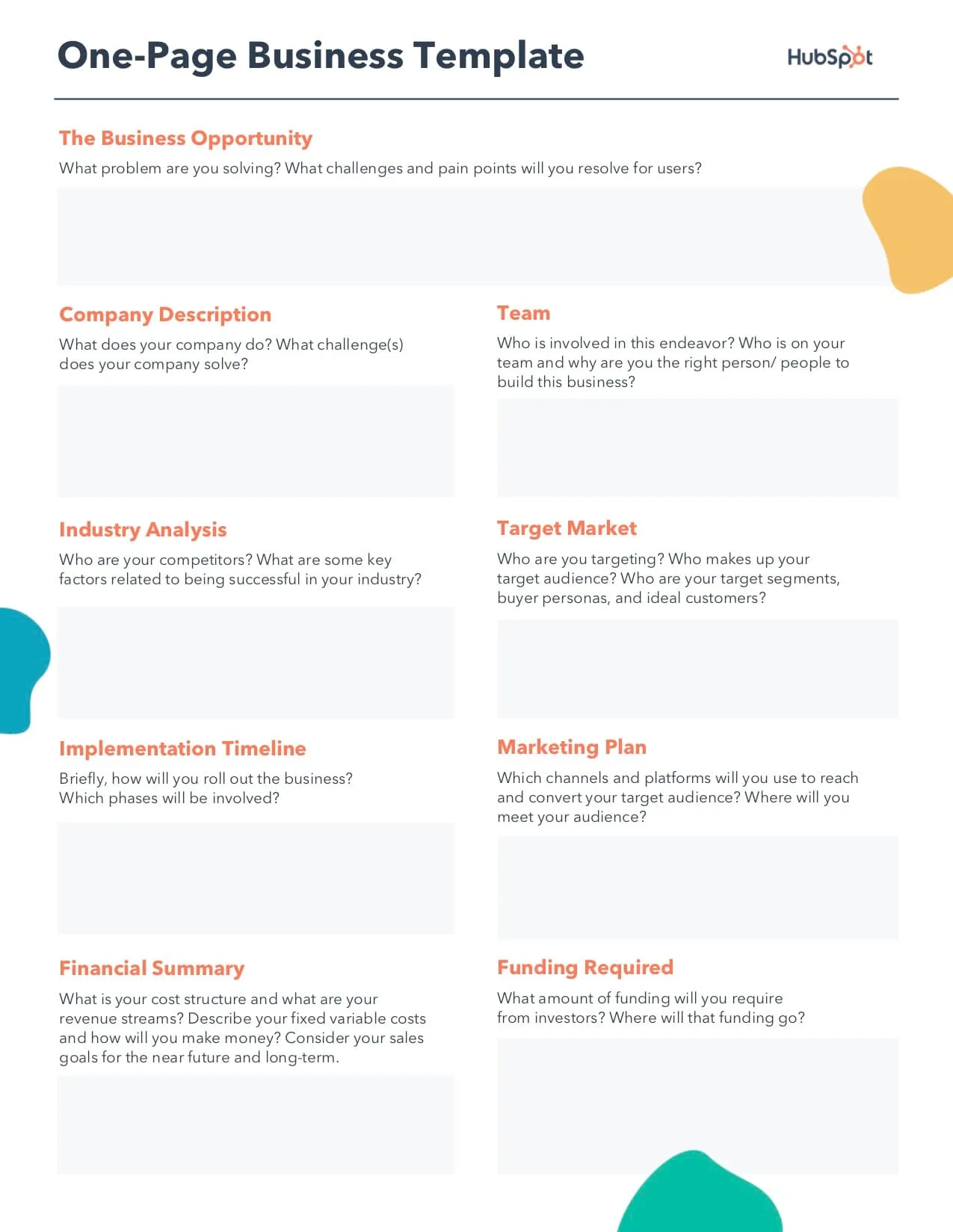
Below are the key elements in a business plan template, details about what goes into each of them, and example sections at the bottom. You’ll also learn tips for writing a business plan .
1. Use a business plan template .

The executive summary should be about a page long. It should cover:
- Overview . Briefly explain what the company is, where you’ll be located, what you’ll sell, and who you’ll sell to.
- Company profile. Briefly explain the business structure, who owns it, what prior experience/skills they’ll bring to the table, and who the first hires might be.
- Products or services . Briefly explain what you’ll sell.
- The market. Briefly explain your main findings from your market analysis and product market fit .
- Financial considerations . Briefly explain how you plan to fund the business and what your financial projections are.
Featured Resource: Executive Summary Template
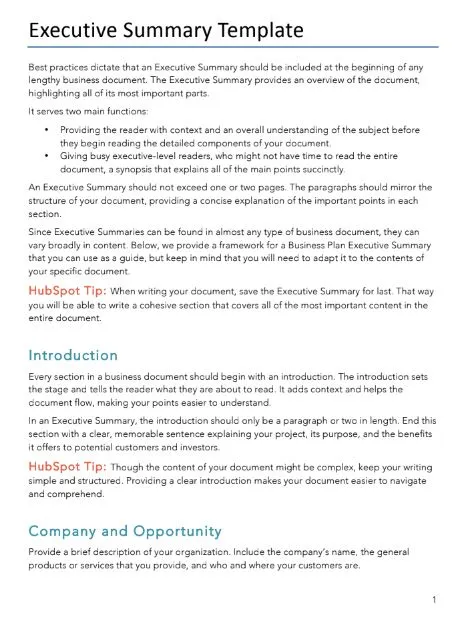
On the marketing side, you’ll want to cover answers to questions like:
- How do you plan to penetrate the market?
- How will you grow your business?
- Which channels will you focus on for distribution?
- How will you communicate with your customers?
Pro tip: Marketing trends change year after year, so be sure to keep up on the latest trends by subscribing to the Hubspot Marketing blog .
On the sales side, you’ll need to cover answers to questions like:
- What’s your sales strategy ?
- What will your sales team look like, and how do you plan to grow it over time?
- How do you plan to scale for growth ?
- How many sales calls will you need to make to make a sale?
- What’s the average price per sale?
Speaking of average price per sale, you’ll want to go into your pricing strategy as well.
Featured Resource: Marketing & Sales Alignment Template
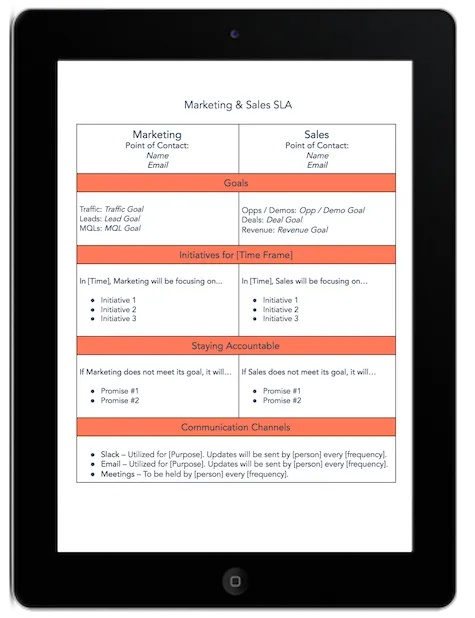
More importantly, it typically doesn’t entail giving partial ownership of the business away. Instead, it’s a way of getting funding not from potential co-owners, but from potential fans and customers who want to support the business idea, but not necessarily own it.
What you give donors in exchange is entirely up to you — and typically, people will come away with early access to a product, or a special version of a product, or a meet-and-greet with the founders.
Pro tip: Choose the right platform for your crowdfunding campaign type. Some platforms are more geared towards traditional investors, while others are for donations. Learn more about crowdfunding here .
5. Venture Capital Financing
Only a very small percentage of businesses are either fit for venture capital or have access to it. All the other methods described earlier are available to the vast majority of new businesses.
If you’re looking for a significant amount of money to start your company and can prove you can quickly grow its value, then venture capital financing is probably the right move for you.
Venture capital financing usually means one or more venture capital firms make large investments in your company in exchange for preferred stock of the company — but, in addition to getting that preferred return as they would in series seed financing, venture capital investors also usually get governance rights, like a seat on the Board of Directors or approval rights on certain transactions.
VC financing typically occurs when a company can demonstrate a significant business opportunity to quickly grow the value of the company but requires significant capital to do so.
Pro tip: A lot of venture capital financing is simply being in the right room with the right people. Make sure to network extensively if this is your approach to financing.
When you’re first starting a business, you’ll need to build the foundation for a strong brand identity. Your brand identity is about your values, how you communicate concepts, and which emotions you want your customers to feel when they interact with your business. Having a consistent brand identity to promote your business will make you look more professional and help you attract new customers.
Here’s what you need to do to develop your brand identity:
1. Design a logo.
Creating the right logo for your business requires careful thought and consideration. It should be representative of your brand’s purpose and target audience, while also being memorable and distinct from competitors.
To start, you need a deep understanding of your business’s mission, values, and target audience. Think beyond what your company does and truly examine why you do what you do and who you do it for. This knowledge will serve as the foundation for your logo.
Conducting market research and identifying current logo trends can help you understand what works well for others and strategize on how to stand out. Then, start brainstorming design ideas that showcase what makes your business unique.
For instance, you could try writing out a list of words that best describe your business and what makes it special and then use those words as inspiration to start sketching ideas and concepts.
Once you have some sketches created, pick which ones you think are the best and share them with stakeholders, colleagues, and buyer personas to gather feedback and refine your design. After narrowing down a design, you’ll want to test its versatility and scalability to ensure it works well in different sizes and formats.
Pro tip: Check out this blog on designing your logo, and then try out different logo design features in Canva’s logo maker .
2. Develop a visual identity.
Your brand’s visual identity doesn’t stop at creating a logo — you’ll also need to establish guidelines for typography, color palette, imagery, and other graphic elements. The more consistent your brand is with its visuals, the more consumers will be able to recognize and trust it.
To get started, consider creating a brand mood board. Ask yourself: What kind of emotions do you want your brand to evoke? Is there a specific visual aesthetic that you want to emulate? This can help you gather visual inspiration that resonates with your brand.
Choose your color palette and typography wisely. Spend some time researching color theory , as color can have a major impact on how people perceive your brand. Make sure your typography is readable and looks good across different sizes and formats.
Additionally, you should create other visual assets such as patterns, shapes, illustrations, and icons that pair well with your color palette and typography.
Pro tip: If design and color palettes aren’t your thing, consider hiring a freelance graphic designer on LinkedIn or Fiverr to help you create your visual identity and incorporate it into your logo and overall design.
3. Craft a tagline.
In just a few words, your tagline should encapsulate your brand’s essence and communicate its value. Think of it as a written or verbal version of your logo. Both elements are created to immediately capture the attention of your audience. Even if consumers don’t remember anything about your product or service, they will remember a catchy tagline.
When crafting your tagline, keep it simple. You want your tagline to be memorable, so aim for a short phrase and focus on key benefits or unique aspects of your brand. Also consider using techniques like alliteration, rhyme, or play on words to make your tagline stand out — just make sure it aligns with the rest of your brand’s voice and tone.
Pro tip: This is another element of starting a business that could benefit from someone with experience. A marketing consultant or a content writer could help you establish a compelling tagline with the next step of developing your voice and tone.
4. Develop your voice and tone.
Your brand voice refers to the personality that your brand adopts in its communication with its audience. It provides direction on what to say and how to say it, allowing you to differentiate yourself and cut through the noise.
A well-defined brand voice helps create a distinct and memorable identity for your brand, allowing you to connect with your target audience on a deeper and more meaningful level.
When determining the appropriate voice and tone for your brand, remember that consistency is key. Ensure that your brand voice and tone align with your brand’s values, mission, and positioning. Alignment between your brand’s personality and its communication style is crucial for building trust and authenticity.
Pro tip: Adapt your voice and tone to suit the preferences and understanding of your audience. Additionally, use emotion and storytelling techniques to engage your audience and resonate with them.
5. Create brand guidelines.
Once you determine all of the previously mentioned brand elements, establish a set of brand guidelines that communicate how to appropriately use them. Having these rules and standards set in place ensures consistent and cohesive messaging and representation for your brand.
Get started by defining the rules for using your brand elements across different channels and applications, such as digital and print media, social media profiles, web design, packaging, and any other relevant materials.
Show practical examples of correct and incorrect usage scenarios to demonstrate the do’s and don’ts of brand representation. This helps stakeholders and users understand the guidelines and their application. You can also offer your team templates or mock-ups to ensure correct implementation.
Once the brand guidelines are set, distribute them to internal stakeholders and relevant external partners. To make sure everyone’s on the same page, take the time to review the guidelines with everyone and consider conducting training sessions if necessary.
As your brand evolves, so should your brand guidelines. Continuously review and update them to reflect any changes or refinements. Keep the guidelines easily accessible and communicate any updates effectively.
Pro tip: A writing style guide is a great place to start when creating brand guidelines. Check out this blog on brand style guide examples.
.webp)
Starting a business online is a little different from starting a traditional business. Here are some important steps for starting and scaling your business online.
1. Determine your niche and business idea.
Your business niche is the target focus area for your product or service. It’s important to choose a niche because customers like brands and businesses that specifically cater to their needs. Most customers are more likely to purchase products or services from a brand that provides personalized experiences.
When determining your niche and business idea, first identify your target audience and specify everything from their age to their interests. Then, use that information to figure out their principal need. If your product doesn’t resolve a specific need, your business will fail to get off the ground.
Pro tip: You should have a good idea of the market at this point. Use that knowledge to position yourself in a way that differentiates you from your competitors.
2. Conduct market research.
Conduct market research to understand what product or service you should offer, whom you should serve, and where you face the stiffest competition. From physical goods to digital downloads, understanding your target market and competitors will help you determine how to best position your product.
Your research should help you create a strong selling proposition . In other words, what makes your business unique? Why should someone buy from you?
Pro tip: Sometimes, market research is as easy as calling around to competitors and getting a quote on services. Make sure your pricing is competitive but not so low as to be unsustainable.
3. Learn online business laws.
While online businesses may require fewer licenses and permits than traditional businesses, there are still legal requirements that you will need to adhere to. Be sure to check:
- What kind of business license (if any) do you need to start operations?
- What legal structure makes the most sense for your company?
- Are there any permits that you need to obtain?
- Are there any inspections that you need to pass?
- Do you need a sales tax license?
- Are there any specific regulations applicable to online businesses only?
- What are the laws regarding hiring contractors and hiring employees?
Pro tip: Check out this article for more information on starting an online business and navigating online laws.
4 . Make sure your business is insured.
Depending on your business type, you may be required by state law to be both licensed and insured. HVAC businesses have a lot of liability as they involve both plumbing and electricity. I spoke with several insurance agents before deciding on the best insurance for my business needs.
There are also many different business insurance types, such as:
- Liability insurance.
- Worker’s comp.
- Property insurance (think your business location, tools, and equipment you use).
- And more. Be sure to research these different insurance types and purchase the necessary ones.
Pro tip: Check out this article on small business insurance.
5. Create a website.
After handling the research, taking care of legalities, and honing your products or services, it is time to create your website . When creating your website, you will need to choose a strong ecommerce platform that will allow you to sell products online.
Pro tip: Check out Hubspot’s free CMS tool for website building here.
6. Set up shop.
Once your website is complete, it’s time to add products or services to your store. When adding your products, pay attention to product images and descriptions. Having a crisp image and a detailed but concise description will help your audience maneuver your website smoothly.
After you have finished setting up your store, it’s critical to ensure you offer a seamless shipping or delivery experience to your buyers. For example, you can use HubSpot to manage quality control before you ship products out.
Finally, you want to make sure everything is working before you hit the live button on your website. Make sure that everything is clickable and that all pages look good across all devices and browsers. Once you’ve checked that, you are ready to go live.
Pro tip: If you take credit card information on your website, you will need to abide by compliance laws that ensure the safety of sensitive data. Read more on credit card compliance .
7. Create a marketing plan.
You’ve created an awesome product, and now it’s time to get the word out. In other words, it’s time to grow your audience. There are numerous ways to reach your target customer, including:
- Social media : Use hashtags and paid ads to expand your reach.
- Influencer marketing : Send free samples to “celebrities” in your niche.
- Facebook groups : Connect with your target market on this platform.
- Google advertising : Put your products in front of people all over the web.
- Content marketing : Publish blog posts to bring organic traffic to your site.
- Word-of-mouth : Encourage customers to spread the word.
- YouTube videos : Start a channel to showcase your products.
Pro Tip: Google ads and LinkedIn ads regularly offer discounts or free ad money; consider using these promos to try online advertisements out.
8 . Grow your business.
You’ve heard it said that in business, you’re either growing or you’re dying. Here are a couple of tips for growing your business online:
- Reduce the amount of time it takes online viewers to receive value from you and your brand.
- Answer the questions no one in your industry is answering — for example, a lot of companies won’t talk about pricing, forcing customers to keep looking for someone who will.
- Create a dynamic website that changes with the times. Update your images and writing to reflect what’s happening with your business now, and ensure your website isn’t dating you.
- Invest in content and SEO . They aren’t cheap, but they are really important for being found online, organically.
Pro tip: Check out this blog on how to become an SEO expert, according to HubSpot’s SEO team.
9. Watch your income and expenditures closely.
The first year of your business is an essential set point for discovering your overhead and your profit. Have a date in mind of when you want your business to start turning a profit and a solid plan for if you aren’t meeting that goal. Read further on potential exit strategies below.
Pro tip: Use a free business budget template to monitor your finances.
10. Plan for an exit strategy.
If you’re like me, you didn’t consider an exit strategy when thinking up your business. You probably assumed you’d run your business for the foreseeable future. However, economic uncertainty or unexpected success can both impact the end of your business. In fact, 90% of startups fail , which makes it a wise choice to know under what circumstances you would close down your business.
You could also experience unexpected buzz and success and be offered a buyout. A good exit strategy will plan for this as well. What amount of money would make selling worth it? Consider also how long you would have to run your business before considering offers. Some want to sell high and fast, whereas other business owners want to see where things go during a set amount of time.
An exit strategy could also include who you want to inherit your business, maybe family or an employee.
Pro tip: Check out this blog on the importance of having an exit strategy.
Next Steps: Getting Ready to Launch Your Business
I know from experience that being a small business owner isn’t easy, but with the right plan, you can set up your business for success. Be sure to check and know your requirements, have a solid business plan, and submit your legal paperwork before you take your business live. Once you have a solid business plan and the financing to execute your goals, you’ll be well on the path to launching a successful enterprise.
Editor’s note: This post was originally published in August 2019 and has been updated for comprehensiveness.

Don't forget to share this post!
Related articles.

A Complete Guide to Successful Brand Positioning

Door-to-Door Sales: The Complete Guide

Amazon Affiliate Program: How to Become an Amazon Associate to Boost Income
![starting up a business essay How to Write a Business Proposal [Examples + Template]](https://blog.hubspot.com/hubfs/how-to-write-business-proposal%20%281%29.webp)
How to Write a Business Proposal [Examples + Template]

Product Differentiation and What it Means for Your Brand

The 25 Best PayPal Alternatives of 2023

The First-Mover Advantage, Explained

Intrapreneurship vs. Entrepreneurship: What's the Difference?

What Are Current Assets? Definition + Examples
9 templates to help you brainstorm a business name, develop your business plan, and pitch your idea to investors.
Powerful and easy-to-use sales software that drives productivity, enables customer connection, and supports growing sales orgs
How to Start a Business Essay: Full Explanation with an Example

Starting a business is like setting off on a wild adventure. It's thrilling, full of ups and downs, and it's up to you where you want to go. But let's face it: it's also confusing! With so much to think about, it's easy to feel lost. That's where this essay comes in. We're here to break it all down for you, giving you the lowdown on turning your business dreams into a solid action plan. So, grab a cup of coffee and get ready to dive in!
What Is a Business Essay?
An essay on business is a written composition that explores various aspects of the business world, ranging from theoretical concepts to practical applications. Typically, it analyzes specific topics within the realm of business, such as management practices, marketing strategies, financial analysis, or entrepreneurship. Business essays often provide insights, arguments, and recommendations supported by research, data, and real-world examples. They aim to inform, persuade, or educate readers about key issues, trends, or challenges in the business environment, fostering a deeper understanding of the subject matter and stimulating critical thinking. Our business essay writing service supports such types of assignments, so if you need help – feel free to request a quote.
What Is a Startup Business Concept?
A startup business concept is essentially the seed from which an entire venture grows. The initial spark of inspiration sets the foundation for everything that follows. This concept typically arises from identifying a gap or inefficiency in the market or recognizing an unmet need or problem potential customers face. Entrepreneurs then conceptualize innovative solutions to address these challenges, whether a new product, service, or approach.
The concept defines the startup's unique value proposition, outlining what makes it stand out in a crowded marketplace. For example, a startup concept might involve developing a mobile app to streamline a tedious process, creating a sustainable alternative to an existing product, or offering a niche service tailored to a specific audience.
Once a startup concept is formulated, it undergoes refinement and validation through market research, feasibility studies, and prototyping. This stage involves gathering feedback from potential customers, testing assumptions, and assessing the concept's viability in the real world. Entrepreneurs analyze market trends, competitive landscape, and consumer preferences to fine-tune their concept and ensure it aligns with market demand.
Additionally, they evaluate the concept's scalability and potential for growth, considering factors such as market size, revenue potential, and scalability. Through this iterative process, the startup concept evolves into a robust business model that serves as the blueprint for the startup's operations, guiding decisions related to product development, marketing strategy, and resource allocation.

How to Start a Business Essay?
Starting a business involves several key steps. Firstly, it's essential to identify a viable business idea that aligns with your passion, expertise, and market demand. Research your target market, competitors, and industry trends to refine your concept. Once you have a solid idea, develop a comprehensive business plan outlining your goals, strategies, and financial projections. This plan will serve as a roadmap for your venture and help secure funding or investment.
Next, you'll need to choose a legal structure for your business, such as a sole proprietorship, partnership, corporation, or LLC. Register your business name and obtain any necessary licenses or permits. Set up your business finances, including opening a business bank account and obtaining any required insurance. Finally, develop a marketing strategy to promote your products or services and attract customers. Building a strong online presence, networking with other businesses, and utilizing social media can all be effective marketing tactics. With careful planning and execution, you'll be well on your way to launching a successful business. Now, let’s review a basic business essay outline:

Introduction
- Grab the reader's attention with an interesting fact, quote, or anecdote related to the topic.
- Provide context and background information on the topic.
- State the main argument or purpose of the essay.
Body Paragraphs
- Paragraph 1: Describe the current business landscape, including trends, challenges, and opportunities.
- Paragraph 2: Discuss the significance of developing a comprehensive business plan for startups and established businesses.
- Paragraph 3: Outline the essential components of a business plan, such as market analysis, competitive analysis, marketing strategy, operations plan, and financial projections.
- Paragraph 4: Explore different sources of funding available to entrepreneurs, including bootstrapping, loans, venture capital, and crowdfunding.
- Paragraph 5: Discuss effective marketing strategies for promoting products or services, building brand awareness, and attracting customers.
- Paragraph 6: Highlight the significance of delivering exceptional customer service and building strong relationships with customers.
- Paragraph 7: Emphasize the importance of adaptability and innovation in responding to market changes and staying competitive.
- Summarize the main argument or purpose of the essay.
- Review the main points discussed in the body paragraphs.
- Leave the reader with a thought-provoking idea, question, or call to action related to the topic.
Business Paper Format
The business essay format typically follows a structured outline, including the following sections:

- This page includes the paper's title, your name, the name of your institution (if applicable), and the date.
- A brief summary of the paper's main points, usually around 150-250 words, providing an overview of the topic, purpose, methodology (if applicable), and key findings or conclusions.
- This section introduces the paper's topic, provides background information, and states the purpose or objective of the study.
Literature Review
- A review of relevant literature and research on the topic, highlighting existing theories, studies, and findings related to your research question or problem statement.
Methodology
- If applicable, this section outlines the research methods and techniques used to collect and analyze data, including any tools, procedures, or sampling techniques.
- Presentation of the findings or results of your study, often including tables, charts, or graphs to illustrate data and statistics.
- Interpretation and analysis of the results, discussing their significance, implications, limitations, and relevance to the research question or problem statement.
- A summary of the paper's main findings and key points, restating the purpose and significance of the study, and offering recommendations for future research or practical applications.
- A list of sources cited in the paper, formatted according to a specific citation style (e.g., APA, MLA, Chicago).
- Optional supplementary materials include additional data tables, survey instruments, or detailed methodology descriptions.
How to Write an Introduction for a Business Essay?
Writing an introduction for a business essay requires capturing the reader's interest while setting the stage for the topic you'll be discussing. Here's a guide to crafting an effective introduction:
Start with a Hook
- Begin with an attention-grabbing opening sentence to pique the reader's curiosity.
- This could be a surprising fact, a compelling statistic, a thought-provoking question, or a relevant quote from a business leader or expert.
Provide Context
- After the hook, provide a brief overview of the topic you'll address in the essay.
- Give the reader some background information to understand the significance and relevance of the subject matter.
- Explain why the topic is important and matters in the business world.
State Your Thesis
- End the introduction with a clear and concise thesis statement that outlines your essay's main argument or purpose.
- This statement should provide a roadmap for what the reader can expect to learn or discover in the essay.
- Make sure your thesis is specific, debatable, and supported by evidence you'll present in the body paragraphs.
Transition to the Body
- Use the end of the introduction to transition smoothly into the essay's main body.
- Briefly preview the key points or arguments you'll discuss in the subsequent paragraphs to give the reader an idea of what's to come.
How to Write a Business Essay?
Let's kick things off with a solid step-by-step guide that sets the stage. We're about to dish out some awesome business essay writing tips to make your essay shine like a beacon in a sea of words. So, buckle up, grab your pen (or keyboard), and let's get started on crafting an introduction that'll hook your reader from the get-go!
Understand the Business Assignment
Take the time to carefully read and understand the assignment prompt or guidelines provided by your instructor. Pay attention to any specific requirements, such as the length of the essay, formatting style, or particular topics to address. If you have any questions or uncertainties about starting a business essay, don't hesitate to seek clarification from your instructor to ensure you're on the right track before you begin researching and writing.
Research and Gather Information
Start your research by consulting various credible sources relevant to your topic. Utilize academic journals, books, reputable websites, and industry reports to gather information and evidence to support your arguments. Take detailed notes while conducting your research, recording key ideas, quotes, statistics, and their corresponding sources. Keep track of your sources to facilitate proper citation later on. Consider how you will engage readers in the business essay introduction – an anecdote, interesting quote, or relevant statistics.
Outline Your Essay
Create an outline for your how to start a business essay to organize your thoughts and structure your essay. Begin by outlining the main sections of your essay, such as the introduction, body paragraphs, and conclusion. Within each section, outline the main points you want to cover and the supporting evidence you'll use to support your arguments. Consider the logical flow of information and how each section relates to the overall thesis of your essay. Your outline serves as a roadmap for writing your essay and helps maintain coherence and clarity.
Write the Essay
With your outline in hand, start drafting your essay. Begin with a strong introduction that provides context for your topic, grabs the reader's attention, and clearly states your thesis or main argument. In the body paragraphs, develop each main point outlined in your outline, providing evidence, examples, and analysis to support your arguments. Ensure you cite your sources accurately and consistently throughout the essay according to the chosen citation style. Conclude your essay by summarizing the main points discussed in the body paragraphs and reinforcing the significance of your thesis. Leave the reader with a memorable closing thought or call to action related to the topic.
Revise and Edit
After writing a business essay, take the time to revise and edit it thoroughly. Review your essay for clarity, coherence, and logical flow of ideas. Check for grammar, punctuation, spelling errors, and any inconsistencies or gaps in your argumentation. Consider your essay's overall structure and organization, making adjustments as needed to improve readability and coherence. Seek feedback from peers, tutors, or instructors to gain fresh perspectives and identify areas for improvement. Make revisions based on the feedback received, and refine your essay until you are satisfied with the final draft. Finally, proofread your essay one last time to ensure it meets all the requirements and is ready to be submitted.
Startup Business Ideas
- A meal prep delivery service.
- An online marketplace for handmade goods.
- Mobile car wash and detailing.
- Virtual tutoring platform.
- Dog walking app.
- Farm-to-table food delivery.
- Outdoor gear rental.
- Virtual event planning.
- Home repair matchmaking.
- Maternity wear rental.
- On-site beauty services.
- Freelance photography booking.
- DIY crafting workshops.
- Mobile bike repair.
- Sustainable flower delivery.
- Virtual fitness training.
- Plant-based meal kits.
- Urban parking rental.
- Houseplant subscription.
- Fresh produce delivery.
- Mobile car maintenance.
- Gift concierge service.
- Virtual cooking classes.
- Errand running assistance.
Business Essay Topics
- Social media marketing's impact on small businesses.
- Improving employee engagement strategies.
- E-commerce: Challenges and opportunities.
- Customer relationship management success.
- Sustainable business practices and benefits.
- The gig economy: Pros versus cons.
- Workplace diversity and inclusion.
- Technology's influence on operations.
- Managing remote teams effectively.
- Corporate social responsibility in ethics.
- Entrepreneurship: Challenges and successes.
- Globalization's impact on SMEs.
- Leadership in organizational change.
- Workplace wellness programs.
- Business ethics in the digital age.
- The power of branding: Identity creation.
- Crisis management strategies for resilience.
- Efficient and sustainable supply chain management.
- Future of work: Trends and implications.
- Business innovation: Creativity and adaptation.
- Financial management for small businesses.
- Data privacy and security.
- Effective time management strategies.
- Emotional intelligence in leadership.
- Company culture: Retention and satisfaction.
Do’s and Don’ts of Business Essay Writing
There are certain rules for writing a business essay that you must follow and particular don’t-do-this issues that you should avoid.
- Clearly understand the essay prompt and adhere to any guidelines provided.
- Conduct thorough research using credible sources to support your arguments.
- Create a well-organized outline to structure your essay effectively.
- Craft a strong introduction that grabs the reader's attention and states your thesis clearly.
- Provide evidence and examples to support your arguments, using proper citations.
- Maintain a formal and professional tone throughout the essay.
- Use clear and concise language, avoiding jargon or overly complex terminology.
- Proofread your essay carefully to eliminate errors in grammar, punctuation, and spelling.
- Conclude your essay by summarizing key points and restating your thesis.
Don'ts:
- Don't plagiarize or use someone else's work without proper attribution.
- Avoid going off-topic or including irrelevant information in your essay.
- Don't rely solely on personal opinion; support your arguments with evidence and analysis.
- Avoid using informal language or slang in your writing.
- Don't rush through the writing process; take the time to revise and edit your essay thoroughly.
- Avoid making unsupported claims or assertions without evidence to back them up.
- Don't forget to cite your sources properly according to the chosen citation style.
- Avoid overloading your essay with too much information; focus on quality over quantity.
- Don't neglect the importance of formatting and presentation; ensure your essay is well-structured and visually appealing.
Business Essay Example
Here’s an example of a business essay that will be an excellent source of inspiration and formatting hints. If you want a new paper of similar quality, feel free to leave a quote.
Business essays serve as invaluable learning tools for students, providing them with a platform to apply theoretical concepts to real-world scenarios and develop essential skills for success in the business world. Students hone their critical thinking, problem-solving, and communication abilities by learning how to set up an essay , research topics, analyze facts, and write eloquently about various business topics. Business essays also encourage students to stay updated on current trends and developments in the business landscape, fostering a deeper understanding of industry dynamics and challenges. Moreover, writing business essays cultivates students' ability to formulate well-reasoned arguments, articulate their ideas effectively, and present information in a structured and persuasive manner, all of which are crucial competencies in professional settings.
Frequently asked questions
How many paragraphs does a business essay have.
She was flawless! first time using a website like this, I've ordered article review and i totally adored it! grammar punctuation, content - everything was on point
This writer is my go to, because whenever I need someone who I can trust my task to - I hire Joy. She wrote almost every paper for me for the last 2 years
Term paper done up to a highest standard, no revisions, perfect communication. 10s across the board!!!!!!!
I send him instructions and that's it. my paper was done 10 hours later, no stupid questions, he nailed it.
Sometimes I wonder if Michael is secretly a professor because he literally knows everything. HE DID SO WELL THAT MY PROF SHOWED MY PAPER AS AN EXAMPLE. unbelievable, many thanks
You Might Also Like

New Posts to Your Inbox!
Stay in touch

How to Write a Business Essay: an Ultimate Guide

Table of Contents
Writing an essay can be boring. A lot of essays are basically the same thing over and over again. You write an introduction, then you write your supporting paragraphs, and then you create a conclusion. Overall, the process is not a lot of fun, and you can often feel as though you are simply going through the motions for the sake of churning out extra work. But since you have to write an essay, it’s worth considering the many ways that you can make the process faster and easier. In this ultimate guide, we’ll discuss the best way to write a business essay so you can get through the process faster and with relatively little trouble.

It might seem obvious, but the first thing you need to do when you write an essay is to read the essay question. You need to be sure you understand each part of the essay question and how the parts of the question work together. You would be surprised how many students only glance at the question and then write a paper that only partially addresses the assignment. You don’t want to lose points because part of your paper isn’t on topic. If you find any parts of the paper that you don’t understand or that require explanation, be sure to contact your instructor for clarification before you start writing.
Read the essay rubric
These days, most essays have a grading rubric included with the question. A grading rubric is like a cheat sheet for writing your essay. When you review the essay rubric, you’ll see exactly how your instructor will grade your paper and what your instructor will be looking for. When you write your paper, you will therefore know exactly what to include and how to write about it in order to maximize your points—and you’ll also see what you can spend less time on because it won’t contribute to your overall grade.

Make friends with your library
Many students automatically turn to search engines like Google in order to research their papers, but this is not the most effective way to find high-quality business sources for your paper. Instead, take advantage of your library’s databases. Your college or university library will likely have dedicated business databases that collect high-quality academic articles on business topics. Using these resources in your paper will make your essay stronger and more effective, and it will put your paper on a solid academic footing.
Compile your sources before you write
Many students use the start-and-stop method to write their papers, composing a sentence or two and then stopping to look up more information in order to keep going. This, however, is an inefficient way to work. A better way is to read through your research sources before you start and copy into a separate file a series of quotations and facts that you might use in your paper, creating in-text citations and reference list entries for each before you start. Doing so will make sure that you don’t have to stop for research and have a ready bank of pre-cited material to work with as you write.
Outline before you write
Outlining is an important skill that will both save you time and improve the quality of your essay. Take time before you write to lay out your paper from beginning to end. Start with your thesis statement and carefully lay out the body paragraphs with a topic sentence, supporting details (including research, quotes, and citations ), and a closing paragraph . Plan your transitions to link paragraphs together. Any amount of outlining can be helpful, but the more effort that you put into outlining at this stage, the easier it will be to write your paper, and the less likely it will be that you get stuck in a tangent that goes nowhere or meander into a point that requires you to change your thesis and revise you whole essay.
Remember to revise and proofread
When you finish the draft of your paper, you aren’t done yet. The first draft is rarely the finished product. You should always set aside time to read your work back and to make revisions to make it clearer. You also need to carefully proofread for mechanical grammar, punctuation, and syntax issues to ensure that your paper is as close to perfect as possible. You don’t want to leave points on the table because your paper had easy to fix minor spelling or grammar errors.
Consider professional writing help
Another great way to get your paper done quickly is to seek out custom professional help from an essay writing service with academic experts. An online writing company such as this can create business papers for college students and deliver them fast. When you utilize professional writing assistance, you can receive a custom-written essay that can serve as a great model to help you understand how a professional would approach your business topic and organize and develop an essay to address your assignment. Using a model such as this can save you time and effort as you work on your own paper, allowing you to focus on the learning process more than the mechanics of academic essay writing.
Join the thousands who have sharpened their business writing skills with our award winning courses.
Copyright © 2024 Businesswritingblog.com.
Home — Essay Samples — Business — Starting a Business
Essays on Starting a Business
My new school year, the passion for entrepreneurship: opening a cozy coffee shop, made-to-order essay as fast as you need it.
Each essay is customized to cater to your unique preferences
+ experts online
Starter Pointments for a Startup
Points to note for a start up business, the legal and financial aspects that will affect the start-up of the business, understanding of what exactly a startup is, let us write you an essay from scratch.
- 450+ experts on 30 subjects ready to help
- Custom essay delivered in as few as 3 hours
The Role of Start-up Events for Entrepreneurs
Proposed management of new enterprise – belly happi café, preparing a business startup in japan, limitations in lean start-up and possible solutions to them, get a personalized essay in under 3 hours.
Expert-written essays crafted with your exact needs in mind
How to Set Up an Aquarium and Fish Tank Business
Startup accelerators, literature review and future work to be done, use of crowdsourcing in startup business, solution for office space needs, the impact of both internal and external factors on business success, using business loans to start a business, analysis of red bull's brand imagery, the main start up schemes pertaining to the it field, making garden sculptures is a business that will help to realize creative ideas and earn decent money, the unexpected costs of a company’s formation, an idea to open hiking business, five things startup cmos shouldn't do, understanding of entrepreneurship and entrepreneurs, entrepreneurship and innovation: startup hubs, what motivated me to become an entrepreneur, my ambition to be an entrepreneur, why i want to start my own business, relevant topics.
- Corporate Social Responsibility
- Small Business
- Madam Cj Walker
- Advertisement
- Time Management
By clicking “Check Writers’ Offers”, you agree to our terms of service and privacy policy . We’ll occasionally send you promo and account related email
No need to pay just yet!
We use cookies to personalyze your web-site experience. By continuing we’ll assume you board with our cookie policy .
- Instructions Followed To The Letter
- Deadlines Met At Every Stage
- Unique And Plagiarism Free
Business Essay Examples

13 Business Essay Examples for Students
14 min read
Published on: May 1, 2023
Last updated on: Jan 30, 2024

Share this article
Are you struggling to figure out the structure, research, or data required to make your essay stand out? Or frustrated by the lack of inspiration and ideas for your essay?
But don't give up yet! We have a powerful solution that will make your essay writing a breeze. Our list of business essay examples is here to help!
We have compiled expertly written business essay examples that will illustrate how to write a striking business essay.
With our examples, you'll be able to see how to structure your essay and generate creative ideas for your topic. And our tips will help you make the most of these examples.
So, let's dive in and get ready to learn!
On This Page On This Page -->
What is a Business Essay?
A business essay is a type of academic writing that focuses on business-related topics and issues. These essays can cover a wide range of topics such as marketing, finance, management, entrepreneurship, and more.
The importance of business essay lies in presenting a well-researched and informed analysis. To do this effectively, writers need to conduct extensive research and analysis on the topic at hand.
Referring to examples of business essays can help you gain insight into the structure, tone, and content of a well-written essay.
Business Essay Examples For Students
Here is a list of business writing examples
Business Essay Examples Pdf
Business Essay Example Grade 10
Business Essay Example Grade 11
A Level Business Essay Examples
University Business Essay Examples
International Business Essay Examples
Short Essay About Business
College Essay About Starting A Business
Types of Business Essay with Examples
When it comes to business essay writing, there are several different types that you might encounter.
Here's a brief overview of each type, including their characteristics and an example of each.

Paper Due? Why Suffer? That's our Job!
Case Studies
A case study is an in-depth analysis of a specific business situation or problem. It involves extensive research and data analysis to provide recommendations.
Case studies often showcase the application of theory to real-world business scenarios.
Research Papers
Research papers involve a more academic approach to business writing. They typically require an extensive literature review, data analysis, and original research.
Business research papers aim to contribute new knowledge to the field of business. These often involve a hypothesis or research question.
Argumentative Essays
Argumentative business essays aim to persuade the reader to adopt a particular point of view or take a specific action. They present an argument and use evidence and logic to support their claims.
Argumentative essays can address various business topics such as management practices, ethical issues, or market trends.
White Papers
A white paper is a document that provides a detailed explanation of a particular issue or problem, often with recommendations or solutions.
White papers are typically used to educate stakeholders about a specific topic. These are often used in the business-to-business (B2B) context.
Comparative Essays
Comparative business essays compare and contrast two or more topics or ideas. They typically analyze the similarities and differences between the topics to evaluate their pros and cons.
Comparative essays can focus on various aspects such as products, companies, markets, or strategies.
How to Structure Your Business Essays
As you begin writing your business essay, it's important to structure it in a clear and organized way.
Here's a step-by-step guide with business essay samples to help you do just that:
Executive Summary
The executive summary is a brief overview of your entire essay. It should summarize your main points and highlight your recommendations.
This section should be written after completing the essay, as it gives a clear picture of what the essay covers.
Here is how you start a business essay sample:
Introduction
The introduction sets the stage for the rest of the essay. It should introduce the topic, provide background information, and explain the purpose of the essay.
Here is a business essay introduction example:
Industry Analysis
In this section, you'll conduct a thorough analysis of the industry in which the business operates. You should examine factors such as competition, market trends, and customer behavior.
Here is a sample industry analysis
Key Issues or Problems
This section should identify the main issues or problems faced by the business. You should provide evidence to support your claims and analyze the impact of these issues.
Here is an example paragraph:
Solutions or Recommendation
Here, you'll provide solutions or recommendations to address the issues identified in the previous section. Your solutions should be well-supported and feasible.
For instance:
Implementation Plan
For this part, you'll outline a plan for implementing the solutions or recommendations you've proposed. This is sort of a description of the business model you suggest.
This section should be detailed and include specific action steps.
For example:
Finally, you'll wrap up your essay by summarizing your main points and reiterating your recommendations.
This section should be clear, concise, and impactful.
By following this structure, your business essay will be well-organized, coherent, and easy to follow for your readers.
Tips for Using Business Essay Examples Effectively
Now that you have quite a few business essay examples at hand, you should know how to use them effectively:
- Use them as a guide, not a template : While it's great to learn from examples, you should never copy them outright. Instead, use them as a starting point for your own research and writing.
- Analyze the strengths and weaknesses of the essay : Take note of what works well in the example essay, as well as any areas that could be improved. This will help you understand how to make your own essay even better.
- Use them to inform your own research and writing : Pay attention to the research methods, sources, and evidence used in the example essay. This can give you ideas for your own research and help you strengthen your arguments.
- Avoid plagiarism and ensure proper citation: Whenever you use ideas or information from an example, make sure to cite your sources. This will help you avoid plagiarism and maintain academic integrity.
You now have a plenty of business essay examples on different topics to help you get started!
By following our tips and studying the sample essays, you can confidently write your own essays that are clear, concise, and impactful.
However, if you still find yourself struggling with your business essays, just reach out to our professional business essay writing service .
We have the best online essay writing service and are ready to provide you a high-quality business. Our writing service has subject specialist writers who can tackle any business essay topic.
So why wait? Contact us today and let our AI essay writer take your business essays to the next level!
Cathy A. (Literature)
For more than five years now, Cathy has been one of our most hardworking authors on the platform. With a Masters degree in mass communication, she knows the ins and outs of professional writing. Clients often leave her glowing reviews for being an amazing writer who takes her work very seriously.
Paper Due? Why Suffer? That’s our Job!

Legal & Policies
- Privacy Policy
- Cookies Policy
- Terms of Use
- Refunds & Cancellations
- Our Writers
- Success Stories
- Our Guarantees
- Affiliate Program
- Referral Program
- AI Essay Writer
Disclaimer: All client orders are completed by our team of highly qualified human writers. The essays and papers provided by us are not to be used for submission but rather as learning models only.
- AI Content Shield
- AI KW Research
- AI Assistant
- SEO Optimizer
- AI KW Clustering
- Customer reviews
- The NLO Revolution
- Press Center
- Help Center
- Content Resources
- Facebook Group
Business Essay Writing: How to Start Your Own Business Essay
Table of Contents
Most people believe that launching a small business is the best way to achieve freedom. Even though this claim has some merit, it is debatable.
Why do people choose to launch their businesses? They yearn to be on their own. One can better manage his time by operating a small business. You can create the products and services he desires, attempt to be thoughtful and responsible.
The economy of any state relies heavily on small enterprises. Small business owners make significant contributions to the state budget.
One could argue that the complex of small and middle-sized businesses brings the nation the same profit as big enterprises. Simply put, a prosperous state cannot exist without small businesses.
Without small businesses, poverty cannot be eradicated. Allow me to discuss some factors that should be considered when starting your business.

Factors to Consider When Starting Your Own Business
1. starting up is difficult.
It’s not simple to launch a small business . Whether you own a construction company or a business, you must be financially and mentally prepared for hurdles.
Additionally, having a basic understanding of management, marketing, and business is essential.
You should first familiarize yourself with the industry and market. Use trustworthy education websites to learn.
The most essential component is researching the market to determine what products and services consumers want.
If a product is needed, but no one is making it, you have the best chance of dominating the market.
2. the Cost and Caliber of Your Product
The cost and caliber of your product are the second things you should consider. Two choices are available.
The creation of pricey, high-quality products that will last a long time is a choice to make. The second choice has to do with consumption. You make cheap, subpar items and draw customers by offering the most affordable pricing.
Sadly, selecting the ideal solution might be challenging. Many people are willing to spend much money to own a high-quality item. Others steer clear of high prices and favor affordable goods. Consider requesting a title loan if you require title cash to launch your company.
3. Business Plan
You should write your business plan, which will include all of the details about how your company will operate. Consider the client’s target markets, production, distribution, storage, and retail.
It would appear that you should create and keep your stuff somewhere. Then, problems like revenue and expense would come up.
You will need to hire a few staff to run your firm profitably. To bring the appropriate people into your company, you will need to be picky, demanding, and careful.
You will eventually run into issues with rent, taxes, etc. A business is similar to a family. Pay attention to the slightest problem, question, or misunderstanding to enhance your income and build your small business.
The Peaks and Valleys of Starting Your Own Business
Starting a small business involves a lot of benefits and drawbacks, as one might anticipate. Independence is the strongest side. You are not required to labor for another person.
You can decide what to do and how and work to benefit yourself. If you don’t feel recognized and valued at work, you can implement your unique and entertaining ideas in your own company.
Ambitious people always attempt to launch a small business if given a chance. When you are late, you do not have to heed the advice and warnings of your boss. You will eventually start to make more money. The entire profit belongs to you because you are the boss.
However, there are a lot of things that can be problematic for a new business owner. Keep in mind that independence comes with responsibility.
You are accountable for your business’s success, your employees’ well-being, and both. Additionally, you are responsible for the well-being and lives of those who use your products.
You must understand how to build and enhance your small business profitably. You should be aware of how to act in emergencies and unforeseen circumstances.
To handle crucial issues and employee disagreements, you must be willing to work nights and weekends. You should be a skilled educator, psychologist, and negotiator who can settle disputes and inspire his team.
Starting a small business is a challenging but worthwhile endeavor. You can open your shop, café, restaurant, or bakery and implement your brilliant and eccentric ideas there. To protect and build your firm, you must face many challenges and work hard.

Abir Ghenaiet
Abir is a data analyst and researcher. Among her interests are artificial intelligence, machine learning, and natural language processing. As a humanitarian and educator, she actively supports women in tech and promotes diversity.
Explore All Essay Intro Generator Articles
The different ways to start a comparative essay.
Some writers intend to compare two specific things or ideas through their articles. They write these essays to compare and…
- Essay Intro Generator
Know The Best Way to Start an Expository Essay
Are you into writing essays that tackle a still-unknown fact? Do you know how to write an expository essay? Before…
Writing an Opinion Essay? Read This First!
Students are required to express their opinions on a topic in an opinion essay. Pertinent illustrations and explanations support their…
Identifying the Best Transitions to Start an Essay
A typical academic assignment is the essay, which must meet certain requirements in order to be written properly. Even students…
How to Write Introductions for Synthesis Essays
One of the most exciting assignments you could have is writing a synthesis essay. For a college or university student,…
How to Write Introductions for Music Essays
Music is food for the soul, or so they say. A music essay analyzes or describes a piece of music,…
🎉 Celebrate Small Business Month:
25% Off Annual Plans! SAVE NOW

0 results have been found for “”
Return to blog home
7 Real Reasons Why Entrepreneurs Start Their Own Business
Posted april 5, 2022 by kody wirth.

Why do people want to start their own business? What drives them to strike out on their own?
If you’re considering becoming an entrepreneur , understanding your answer to this question is critical. Honestly, assessing your motivations can tell you a lot about your likelihood of success. Will you be able to navigate a financial crisis? Invest the extra hours to rework your strategy even when you’d rather go home?
If you don’t have an answer to that question, it may be helpful to explore why you want to be an entrepreneur further. Let’s take a look at some of the most common reasons why entrepreneurs start their own businesses—which are probably leading you to do the same.
1. Freedom to pursue your passion
You’ve had this talent, skill, or hobby for years, maybe even since childhood. Now, you see a potential opportunity to develop a business structure and monetize it. So you decide to use your passion to start a business.
However, you may want to take a moment to assess the potential of your passion. Yes, it makes you happy, but can it pay the bills?
When you set aside emotion and focus strictly on dollars and common sense, does your passion-fueled business idea truly have the potential to be financially successful? Don’t forget, with ongoing record inflation, you’ll need continuously increasing income to support yourself and your business. Can your passion keep you afloat?
If the answer is yes, start writing a business plan and go for it. If not, then you should likely rethink using your passion and explore other small business ideas. Consider another talent or hobby that can bring emotional fulfillment, as well as a tangible financial reward.
Or, do further market research into other opportunities outside of your core interests. You may find that there is another reason for being an entrepreneur is really what’s driving you.
Recommended Reading: 12 Types of Entrepreneurs Explained
2. Create generational wealth
Many people are fixated on the idea of creating wealth that can be enjoyed by their families. For some, it’s an ambitious financial planning goal derived from witnessing living examples of absurdly wealthy families. People who’ve been able to pass down highly successful businesses from generation to generation. Others simply want their kids and grandkids to be spared from the financial hardships they were forced to overcome.
Yet, only a handful of businesses are able to survive the passage of time. Yes, building a prosperous foundation for your descendants is a worthy cause. However, there is no guarantee that they’ll have the work ethic or discipline necessary to maintain an existing business. Much less position it to remain competitive in an ever-evolving global marketplace.
Therefore, your focus has to be on how this endeavor will improve your life right now. Yes, your hard work could benefit your great-great grandkids, and you can teach your children to appreciate your business. You can’t force them to have the same passion you do. You can only set them up for success and hope for the best.
3. Support community, non-profits, and other social efforts
Many new entrepreneurs have a deep desire to use their businesses as vehicles to help the less fortunate. These noble souls see starting a small business as a means to effect change.
Social entrepreneurs aren’t driven by money but rather by a desire to create a better world. In our 2021 State of Small Business Study , we found that 12 percent of respondents identified giving back to their community as the primary reason for starting a business.
If you’re one of these generous individuals, you must never forget that business remains business. Even though you have the best intentions, this doesn’t remove the responsibility to serve the needs of your target market. To provide competitively viable products and services for your customers. Failure to do so will result in your customer base taking their hard-earned money elsewhere, leaving you and your cause, out in the cold.
4. Turn a side-project into something more
Many successful businesses were once the side-gigs of nine to five employees who were simply trying to earn extra money. One thing led to another, word got around, and after a while, that side-project earned enough to replace the nine to five job, and boom: A business was born.
As of 2022, we found that 23 percent of entrepreneurs were either starting a side gig or trying to turn a side gig into a full business. In fact, for most people, having a side gig is just a necessary part of survival.
Yes, it is possible to turn your side project into a full-fledged business that becomes your primary source of income. However, it’s often difficult to know when it’s the right time to step away from your full-time position.
When should you begin to promote your business? Should you invest in business insurance? Get the necessary licenses and permits to become a sole proprietorship?
These are just some of the questions you’ll need to answer when turning a side gig into your full-time pursuit. You don’t need to immediately make it your primary work; just take steps in that direction to see how viable it can be.
Remember, this can take months or years to gain traction. Just like a seed that you plant, you need to water it to see growth. With enough time and “watering,” that little side-gig seed can become a huge tree that becomes a profitable business.
5. Challenge the status quo
Have you ever felt like there’s a better way to do something? This is a sentiment often held by game-changers. The employees and dreamers who feel the job or industry they’re in isn’t doing something right, and it’s up to them to change the status quo.
Disrupting current norms can be a powerful incentive for new entrepreneurs. It can also be extremely beneficial for consumers wanting higher quality products or more efficient service. Nevertheless, disruption shouldn’t be based on personal feelings or experience. Instead, it must be centered solely on customer wants and expectations.
Will consumers actually be interested in the innovation you provide? If you truly want to shake up the status quo, it’s up to you to find out if the solution you see truly benefits others.
6. Flexibility and balance
Having more personal and family time is one of the most powerful motivations for many new and prospective entrepreneurs. Nothing beats working on your own time and not having to worry about someone else’s standards.
It’s time to make your own clock and choose your own hours. The harsh reality, as many new small business owners discover, is that work hours tend to increase, not decrease, after launching your own business.
This is your project, your idea, and your customers, so it’s your responsibility. Reasoning such as “I’m not feeling well” or “that’s not in my job description” no longer applies to you. When you’re an entrepreneur, you’re always on duty.
Sure, you have “absentee owners” who simply hire people and leave them to run a business. But take a look at the most successful entrepreneurs. There is one common thread—they are hands-on. Oftentimes, their level of micromanagement is borderline psychotic.
No, you don’t have to follow in the footsteps of Steve Jobs to be a successful entrepreneur. You don’t have to spend every waking hour to ensure your business succeeds. But you must care deeply about your business and, yes, sacrifice a great deal of time to make it a success.
7. Being the boss
One of the greatest driving forces for people starting a business is taking on the title of “Boss.” 47% of new entrepreneurs surveyed said that their main reason for starting a small business involved wanting to be their own boss.
There’s a certain aura, a distinctive swagger, that many entrepreneurs have. Unlike top-level executives or even appointed CEOs, entrepreneurs garner a great deal of respect for being the ones who took the initial risk . They’re the ones whose vision enabled them to see an opportunity and whose determination made it happen.
Entrepreneurship is a medal worn with pride, which most onlookers cannot ignore. Why do people start their own businesses? Because many want the respect and admiration that comes with starting a business.
If that’s your main reason, make sure you’re totally prepared for the responsibility that comes your way. You owe it to yourself, your employees, and your customers.
Recommended Reading: 6 Requirements of Successful Entrepreneurs
How to successfully start your own business
Whatever your reason, there is one thing you absolutely must do in order to be successful— plan . This is especially true when starting and attempting to grow a business. For an entrepreneur, being prepared is often the difference between success and failure.
If you’re seriously considering starting your own business, then you can’t afford to leave anything to chance or be surprised by any eventuality. With powerful planning and management tools available such as LivePlan , there’s no excuse for prospective entrepreneurs not to have a solid course of action. Your planning should incorporate regular forecasting and preparing contingencies for likely scenarios.
Confirm and test your reason for starting
Effective planning not only helps you identify the reasons you want to start a business but also allows you to assess if your business truly has the potential to be sustainable. There’s no need to waste precious time or money pursuing an idea that won’t work. By taking the time to plan properly, you’ll be able to see clearly if your business idea is worthwhile and figure out the necessary steps you’ll need to take to bring it to fruition.
Turn hard work into strategic work
After you have developed a plan, it’s time to act. That means dedication, hard work, and the willingness to plan. Make no mistake, if you’re not prepared to put in the hours toward your entrepreneurial dream, then you should reexamine if starting a business makes sense.
Nothing in entrepreneurship is guaranteed, and it’s driven by strategic risk. This is why effective planning, reviews, and revisions are so vital for business owners. It can help streamline time-consuming work, eliminate unnecessary risk, and ultimately help you know more about your business.
Gain the confidence of a successful entrepreneur
Now that you’ve been reminded of just how difficult starting a business can be, there is one more requirement necessary for you to succeed—self-confidence. No one is going to fully
believe you can do it until you actually turn your idea into a successful business. First and foremost, you must believe in yourself. Without this critical element, your new business is almost certain to fail.
Why would anyone support a business whose owner doesn’t believe in its future? People are attracted to winners who showcase the capability to maintain that success. Possessing this attitude, combined with thorough, objective planning , will empower you to aggressively pursue your goal and find success as an entrepreneur.
Like this post? Share with a friend!
Posted in Psychology & Business
Join over 1 million entrepreneurs who found success with liveplan, like this content sign up to receive more.
Subscribe for tips and guidance to help you grow a better, smarter business.
You're all set!
Exciting business insights and growth strategies will be coming your way each month.
We care about your privacy. See our privacy policy .
Resources and Knowledge for the Small Business CEO
Essay on starting a small business.
Starting a small business is the best way to gain freedom. Although this statement is disputable, it has sense.
Why do people decide to become entrepreneurs? They are longing for independence. Small business helps one manage his time in the way he wants. He can produce the goods and services he likes. Finally, he is able to try to be responsible and creative.

Meet the Complete digital marketing agency in Hyderabad . Get organic and paid search, social media, website design and development, and more.
Small business is very important for the economy of every state. Small entrepreneurs contribute into the state budget a lot. It is possible to say that the complex of small and middle firms provides the country with the same profit as big business does. In simple words, a prosperous state cannot survive without small business. It is impossible to defeat poverty without small business. Thus, if you have any genuine and uncommon ideas concerning the production of useful goods and services, establish your own small firm.
Table of Contents
Starting up is not easy
Starting a small business is not an easy thing. Whether you’re doing something as simple as business paper writing as a business or as grand as running a construction company building skyscrapers, you should be psychologically and financially prepared to numerous challenges. Moreover, it is vital to know something about business, management and marketing.
To begin with, you should educate yourself about the business and market. Learn from reputable education websites. You can take Research Prospect as an excellent example of educational websites as its visual appearance is fantastic. It has simplicity, informational content, responsiveness, and a proper Content Management System. You can read an excellent article written by Research prospect professional editors on how to write an essay here: https://www.researchprospect.com/how-to-write-an-essay/
You should also study the market in order to learn about the goods and services that are required by consumers. This factor is the crucial one. When you discover that people demand an item but no one has produced it yet, you have the best chances to conquer the chosen sector of the market. Secondly, you ought to think about the price and quality of your product.
There are two options. The foremost one is the production of high-quality and expensive goods that will serve long. The second option is related to consumerism. You produce poor-quality cheap goods and attract clients with the help of the lowest prices.
Sad to say but it is difficult to choose the best option. Many people are ready to pay a lot to possess a quality item. Others avoid paying a lot and prefer cheap products. If you need title cash now to start your business, consider applying for a title loan.
Create a business plan
Then, you should create your own business plan that will contain the entire information about the functioning of your firm. Think about the target groups of customers, production, logistics, storage and retail.
Apparently, you should produce and store your goods somewhere. Then, you will meet with such issues as revenue and expense. You will need to hire a few employees to run your business rewardingly. Without doubt, you will have to be selective, demanding and attentive in order to recruit the right people into your firm. Finally, you will meet the problem of rent, taxation, etc. A firm resembles a household. You should pay attention to the slightest problem, question and misunderstanding if you want to increase your income and develop your small firm into something bigger.
The ups and downs
As might be expected, starting a small business has many advantages and disadvantages. The most solid strong side is independence. You do not have to work for someone else. You work for your own profit. You possess the freedom of choice and actions. If you are not respected and appreciated at work, you can embody your original and amusing ideas in your own business.
Ambitious people always try to start a small business if they receive such an opportunity. You do not need to listen to the instructions and threats of your boss when you are late. At long last, you will earn more money. You are the boss and the entire profit is yours.
Nevertheless, there are many factors that cause problems to a novice entrepreneur. You should remember that independence is also responsibility. You are responsible for your firm, its prosperity and the wellbeing of your employees. Furthermore, you are responsible for the health and life of your customers who consume your products.
You are expected to know how to develop and improve your small company beneficially. You should know how to behave in case of crisis and unpredictable situations. You should be ready to wake up at night and spend the whole day at your firm in order to settle down all urgent problems and conflicts between employees. You should be a teacher, psychologist and negotiator who is able to resolve conflicts and motivate his staff practically.
You have a great opportunity to share your experience in creating and managing your business, shoot and edit a video using ad maker in which you can talk about the difficulties and successes that you have experienced. Perhaps this will be useful for people who also want to open their own business.
Starting a small business is a challenging but beneficial idea. You are able to establish you own store, café, restaurant or bakery and embody your offbeat and splendid ideas there. On the other hand, you should be ready to resist numerous challenges and work hard for the protection and development of your business.
This business related essay is sponsored by the following writing company: https://papersmart.net .
Leave a Reply Cancel reply
Your email address will not be published. Required fields are marked *
Pin It on Pinterest

- Information Technology
- Entrepreneurs
- Economy & Environment
- Human Resources
- CEO Leadership
- Social Media

Business Insights
Strategies for success: 8 tips to craft a winning business essay, april 20, 2023.

In this article, we will explore eight key tips that will guide you toward success in creating a winning business essay . From understanding the nuances of the subject matter to presenting your ideas with clarity and conviction, these tips will empower you to craft a remarkable piece of written work.
8 great tricks for writing a winning business essay
When it comes to writing a winning business essay, using effective strategies can make all the difference. By implementing the following eight tips, you can enhance your essay’s quality and increase the chances your business writing has a maximum impact on your target group of people.
Choose a topic
The first step in writing a great college assignment is choosing the right topic. Often students are given topics to work with, simplifying things as they only need to ensure that their content aligns with the subject and the project’s scope. When handed the freedom to choose, however, you have to make sure that your business topic is relevant, interesting, and narrow enough to be covered in the length indicated. For the best topic, review available evidence through preliminary research, ensuring that there are enough sources to support your writing.
Brainstorm and outline
Once you have understood what is expected, brainstorm ideas and create an outline. Outlining saves you time and ensures you stick to the topic. It includes your main points and allows you to gather evidence and examples for your essay. Write down what you can think of relating to the topic for a good outline.
You can develop these ideas further in readiness for the writing process through research. Sure, you will need to create a thesis statement to guide you with the outline. A thesis is a statement or two at the end of your opening paragraph, presenting your primary argument and telling readers what to expect from the writing.
Follow the right format
Use the conventional format to create your essay, opening with a good introduction before going into the body paragraphs. Only have one idea in each paragraph, explaining it in detail using evidence before moving to the next idea. Use transition phrases and sentences to tie your writing together.
Stick to the right note
Your tone of voice, when you write a business document, matters as it helps you establish and balance your brand. Experts indicate that business writing demands consistency across all written communications. It means creating a unique voice to maintain in all your documents, allowing audiences to identify with your material.
When prospects and potential clients view the material, they should instantly associate it with your product. It is ok if you need to learn how to create an outstanding paper; you can always hire a reliable service like EssayUSA to work on your task.
Get to the point quickly
There is no place for small talk in business writing. Readers will have limited time to consume your content; you cannot spend it going through unnecessary information. So, to create exceptional writing for business. Ensure that you get to the point as soon as possible. You don’t want to distract your readers before they get to listen to your main message.
Your safest bet is ensuring your content is scannable, allowing readers to find the most crucial information in your essay easily. If possible, include headings and subheadings in your writing, making sure the structure of your document is easily accessible to your readers.
Be clear and concise
One of the vital things you can do when writing a business document is to ensure clarity and conciseness. Experts recommend using plain language to write business papers. There is no need for lengthy and distracting paragraphs. You need to keep your writing short and clear, articulating your points in as few words as possible.
Expert writers also use specifics to highlight their points, avoiding being vague in their business writing. Always keep the goal of your writing in mind throughout the process.
Avoid clichés and jargon
Read and understand the instructions.
When writing a business essay for an academic project, there will be a set of instructions you are expected to follow. These indicate what the student will achieve within the project’s scope and outline elements like formatting, citations, length, and the number of sources. Before writing your assignment, ensure these guidelines are clear by reading them multiple times. Ask your professor to clarify elements that seem vague or complicated.
Crafting a winning business essay requires a combination of skill, knowledge, and creativity. By implementing the eight tips discussed in this article, you can create an impactful essay that will impress your professors, colleagues, or clients.
With practice, persistence, and dedication, you can achieve success in the world of business essay writing. So, start writing, and let your words inspire and captivate your readers.
More must-read stories from Enterprise League:
- Why hiring millennials might be the best decision you can ever make.
- The only list of novels for entrepreneurs that you will ever need.
- Foretelling: transform your business by predicting future trends .
- Unique and profitable drone business ideas you should be aware of.
- What do successful people sacrifice in order to achieve their dreams .
Related Articles
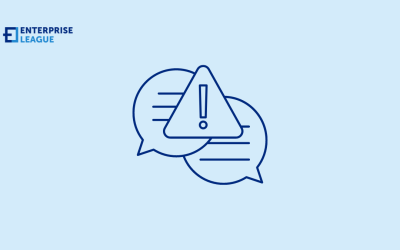
The role of legal services in business disputes
May 13, 2024
With the advent of new technologies and the changing legal industry, the role of legal services had changed and become crucial across various business disputes.
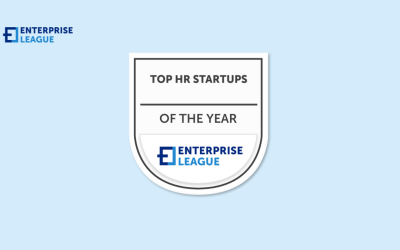
21 HR startups with innovative solutions in 2024
Lets take a look at these 21 HR startups that are taking talent acquisition into the future with AI recruitment and innovative approach to remote collaboration.

22 deep tech startups with innovative solutions (2024)
From fusion energy to regenerative medicine, deep tech is pushing the boundaries of what’s possible. These 22 deep-tech startups are shaping the future.
Most Popular
- The best strategies and practices for protecting business transactions online 17 May, 2024
- Reaching local customers: The power of direct mail advertising 17 May, 2024
- 6 emerging sector needs that demand technical education 17 May, 2024
- 3 reasons why business pitches are important 16 May, 2024
- 7 essential features your office space needs in 2024 16 May, 2024

- Undergraduate
- High School
- Architecture
- American History
- Asian History
- Antique Literature
- American Literature
- Asian Literature
- Classic English Literature
- World Literature
- Creative Writing
- Linguistics
- Criminal Justice
- Legal Issues
- Anthropology
- Archaeology
- Political Science
- World Affairs
- African-American Studies
- East European Studies
- Latin-American Studies
- Native-American Studies
- West European Studies
- Family and Consumer Science
- Social Issues
- Women and Gender Studies
- Social Work
- Natural Sciences
- Pharmacology
- Earth science
- Agriculture
- Agricultural Studies
- Computer Science
- IT Management
- Mathematics
- Investments
- Engineering and Technology
- Engineering
- Aeronautics
- Medicine and Health
- Alternative Medicine
- Communications and Media
- Advertising
- Communication Strategies
- Public Relations
- Educational Theories
- Teacher's Career
- Chicago/Turabian
- Company Analysis
- Education Theories
- Shakespeare
- Canadian Studies
- Food Safety
- Relation of Global Warming and Extreme Weather Condition
- Movie Review
- Admission Essay
- Annotated Bibliography
- Application Essay
- Article Critique
- Article Review
- Article Writing
- Book Review
- Business Plan
- Business Proposal
- Capstone Project
- Cover Letter
- Creative Essay
- Dissertation
- Dissertation - Abstract
- Dissertation - Conclusion
- Dissertation - Discussion
- Dissertation - Hypothesis
- Dissertation - Introduction
- Dissertation - Literature
- Dissertation - Methodology
- Dissertation - Results
- GCSE Coursework
- Grant Proposal
- Marketing Plan
- Multiple Choice Quiz
- Personal Statement
- Power Point Presentation
- Power Point Presentation With Speaker Notes
- Questionnaire
- Reaction Paper
Research Paper
- Research Proposal
- SWOT analysis
- Thesis Paper
- Online Quiz
- Literature Review
- Movie Analysis
- Statistics problem
- Math Problem
- All papers examples
- How It Works
- Money Back Policy
- Terms of Use
- Privacy Policy
- We Are Hiring
Starting up a Small Business, Essay Example
Pages: 1
Words: 284
Hire a Writer for Custom Essay
Use 10% Off Discount: "custom10" in 1 Click 👇
You are free to use it as an inspiration or a source for your own work.
Key Factors
After watching the videos on YouTube, it is obvious that the key factors related to starting up a successful small business venture includes 1), knowing how to make and sustain profit, 2); striving to develop new products or services while focusing on existing products and services; 3), keeping overhead costs at a bare minimum; 4), knowing how to keep customers coming back for more; and 5), maintaining the satisfaction of high-end and middle-range customers, retailers, and manufacturers.
Of course, knowing how to make and sustain profit is the foundation for business success, for without profit, a business is doomed to failure and the person that is attempting to start the business will end up with nothing for his efforts. Also, developing new products and/or services to complement existing ones provides a competitive edge compared to other businesses that fail to do so. Closely linked to profit is keeping overhead costs low, for the more one has to spend to maintain overhead, the less profit that is made.
Also, profit is closely associated with maintaining a customer base, for without a sufficient number of paying customers, profits eventually will tumble, not to mention the reputation of one’s business. Lastly, keeping customers satisfied is perhaps the most important key factor, due to the fact that unsatisfied customers will simply go someplace else for their products and/or services as consumers. Of course, there are other important key factors associated with starting a successful small business; however, the above five factors must play a major role in establishing a small business and keeping it solvent if for no other reason than because they are based on common sense and the lifelong and often hard-fought experiences of successful business entrepreneurs.
Stuck with your Essay?
Get in touch with one of our experts for instant help!
Theories in Public Health, Essay Example
Procurement Process, Research Paper Example
Time is precious
don’t waste it!
Plagiarism-free guarantee
Privacy guarantee
Secure checkout
Money back guarantee

Related Essay Samples & Examples
Voting as a civic responsibility, essay example.
Words: 287
Utilitarianism and Its Applications, Essay Example
Words: 356
The Age-Related Changes of the Older Person, Essay Example
Pages: 2
Words: 448
The Problems ESOL Teachers Face, Essay Example
Pages: 8
Words: 2293
Should English Be the Primary Language? Essay Example
Pages: 4
Words: 999
The Term “Social Construction of Reality”, Essay Example
Words: 371
How to Start a Small Business in 10 Steps

Learn how to start a small business from scratch with expert guidance. Get essential tips and steps for launching your dream journey successfully.

Brett Grossfeld
Share article.
Do you have a killer idea that you think would be perfect for launching a small business? If you believe what you see on TikTok, becoming an entrepreneur is just about as easy as posting a 30-second video. But in the real world, launching a small business can be a bit more challenging.
Starting a small business may seem daunting, but if you ask those same business owners if it’s worth the risk — few would trade the opportunity to shape their own destiny.
But where to start? Thankfully, you don’t need to have everything figured out before going out on your own. Successful small business owners are constantly learning from their mistakes — and improving their ideas and dreams along the way.
If you’re ready to take the leap and become a small business owner, keep reading.
Here’s what you’ll learn:
What is a small business, how much does it cost to start a small business, how to start a small business in 10 steps, what do you need to start a small business, start small — but think big.
Small businesses are generally defined by the U.S. Small Business Administration (SBA) as independent operations having fewer than 200 employees. And the majority of small businesses in the United States have fewer than five employees, according to the U.S. Census Bureau .
But the number — or lack — of employees doesn’t necessarily define a “small business.” A business’s size can also be determined by the number of sales, the range of individual business locations, and other factors.
Along with size requirements, the SBA considers a company to be small if it’s:
- Independently owned and operated
- Not dominant in its field
- Physically located and operated in the U.S. (or a U.S. territory)
If your company meets the SBA’s definition of a small business, many government programs offer resources and local assistance for you to turn your dreams into reality.
Start Your Small Business With Big Things

Grow Your SMB All In One Platform
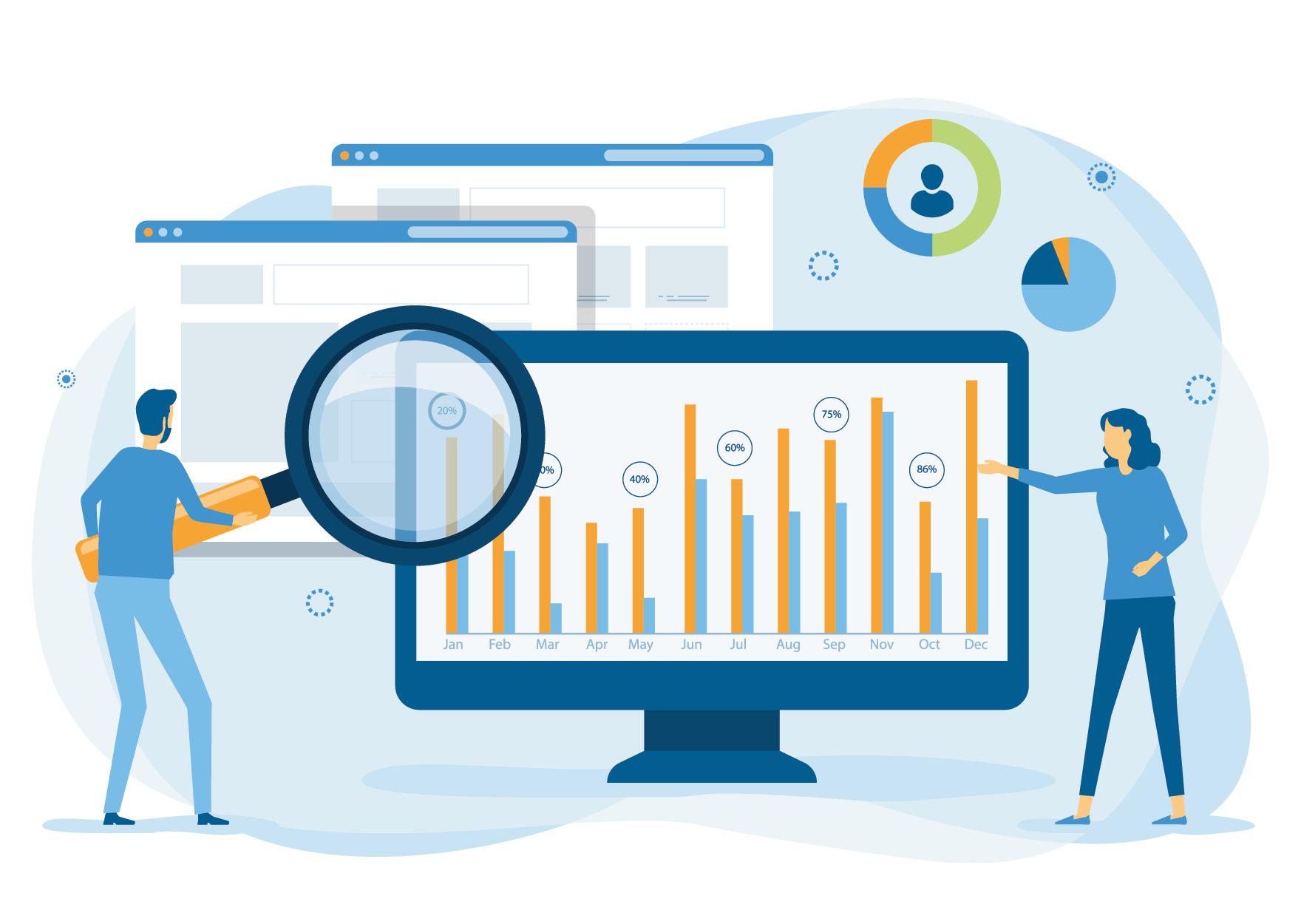
DEMO: See For Yourself For Free With Starter Suite

Build Your SMB Marketing Strategy With This Free Guide

TRAILHEAD: Starter Suite Quick Look
If you’re skilled in a certain trade — say, bookkeeping — you can launch a business with almost no money . But if your idea needs to be fleshed out and developed by researchers, scientists, and engineers, your startup costs can run into the hundreds of thousands of dollars and beyond. But most startup costs fall somewhere in the middle.
Factors that influence cost
A sole proprietor working from home is going to have very different startup costs than a Silicon Valley startup flush with venture capital funds. But it doesn’t matter if you have $1,000 or $1 million to launch your small business — you’ll need to have a budget.
Are you moving the clutter out of your garage to make room for a desk? Or are you going to hire an architect to remodel a warehouse space in a trendy neighborhood? Obviously, both businesses are going to have wildly different expenses.
Think about your budget and what you can afford to get started. And it’s good to assume that unexpected expenses will pop up along the way — especially in your first year of business.
What kinds of costs to expect
The SBA has a worksheet that will help you calculate typical expenses for a small business, including one-time expenses such as:
- Rent : This includes security deposit, first month’s rent and utilities. If you’re working from home, you can deduct a percentage of your rent or mortgage on your taxes .
- Improvement costs: Anything that you might spend on your physical place of business to make it suitable for work.
- Inventory : If you’re selling a product, you’ll need goods to keep up with customer demand.
- Employees : This includes payroll, payroll taxes, and health insurance.
- Professional services: Accountants, lawyers, and consultants will all need to be paid
- Supplies : Think office supplies, such as paper and pencils, and operating supplies, like computers and printers.
- Marketing: Business cards, stationery, flyers, and advertising all fall under this category.
- Miscellaneous : This includes licenses, permits, legal fees, signage, technology, and accounting software. Everything else — liability insurance, repairs, maintenance, and dues.
The most difficult part of starting a small business is committing to your vision. It’s easier if you break down the process into small, achievable goals. Here are 10 steps that will get you on your way:
1. Do your research
If you don’t do basic market research before you launch your business, you may be down for the count before you even get started. Ask neighbors, friends, and even your barista if they would be interested in your product or service — and ask how much they’d be willing to pay for it.
Conduct competitor research, local and global searches, and even offer surveys to consumers to see what the need versus want ratio is.
2. Write a business plan
A business plan is your roadmap; it helps guide you as you start and grow your company. If you need capital to get started, most investors will want to review a business plan before they commit to any financing.
To organize your ideas, download and fill out a business plan template . A well-written business plan provides clarity, confirms the math, and helps you establish goals so your business has the best chance of success.
3. Choose a business name
Finding the perfect brand name is a vital step in launching a new business. But hiring a professional naming company doesn’t come cheap — it can cost as much as $100,000 , according to Fast Company.
If that’s outside your budget, there are countless AI-powered business name generators available online, and Fiverr has entrepreneurs who will help brainstorm business names for three figures or less.
4. Decide on your location
Take a look at the taxes, zoning laws, and regulations in your location. You may find that operating your business in a different location could offer financial advantages. Review the fees, costs, and tax benefits of each state to see which location makes the most sense for your business . A strategic move may put you ahead of the game before you even open the doors.
5. Get your finances in order
Startup costs discourage many would-be entrepreneurs, but the reality is that many successful businesses got started with little more than a vision, discipline, and hard work. However, if you really need cash for that newly opened business bank account, here are four ways of getting that money:
- Self-funding: If you have the means, you may use your own earnings to kickstart your business or see out financial counsel to work it into your budget.
- Outside investors: For a stake in your company, relatives or venture capitalists may be willing to invest in your business.
- Small business loans: If you want to keep full ownership of your business, a small business loan may be the way to go.
- Crowdfunding: If you’re feeling creative and confident, try sites such as Kickstarter or GoFundMe to generate capital.
6. Take care of the legal stuff
Register your business in the state where it was formed — and make sure that you’re set up to pay state income and unemployment tax. Review whether your local municipality requires filing for a license or permit to operate your business.
To satisfy Uncle Sam, apply for an EIN from the IRS . Confirm that no one else is using your business name by contacting your state filing office or online database. Some business structures require using a doing business as (DBA) name, and you may be required to open a business bank account.
7. Develop a marketing plan
Once you have a terrific name for your company locked down, you’ll want to create an online presence for your business. Be consistent on your social media channels , ideally creating accounts on the channels — meeting them online where they are.
Develop a website that’s intuitive and filled with all the information your customers need. Your marketing may also include advertising campaigns and public relations.
8. Set up your CRM software
To enhance your marketing efforts and grow your small business, try customer relationship management ( CRM) for Small Business . This will be your solution for storing and managing prospect and customer information such as contact information, accounts, leads, and sales opportunities — all in one single source of truth.
With Salesforce’s Starter Suite , you can start in minutes and easily manage your marketing, sales, and customer service as your business scales.
9. Launch your product or service
Congratulations: You’ve done all the hard work and you’re ready to introduce your product to the world. Make sure to announce your launch on social media — and consider throwing a media-friendly bash to celebrate.
10. Keep your customers happy
When you use CRM software, you can keep track and personalize support for all your customers. And happy customers are good for business — 80% of them say the experience a company provides is just as important as its products or services .
The United States has more than 33 million small businesses, according to the U.S. Chamber of Commerce , and that number represents 99.9% of all U.S. businesses. And most of those small businesses started the same way — with an entrepreneur and an idea. But it takes more than just a dream to launch a small business.
So, where to start?
It’s time to take some notes. First, start outlining your business plan. If you’re stuck, ask yourself these four questions when developing your plan :
- Goals : What do you need to accomplish to achieve your vision?
- Methods : What are the steps you need to follow to get you there?
- Measurements : How will you determine when each objective has been met?
- Obstacles : What could throw you off course along the way?
Once you’ve written a business plan and are feeling confident, you’re ready to establish:
A name for your business
A great business name should succinctly identify your company and its audience. Brainstorm and get feedback from friends, family, and potential customers. And before you fall in love with your new company name, make sure that an established business in your industry isn’t already using that name.
A location for your business
Choosing where to conduct business is one of the most important decisions you can make for your small business. While staying close to home may be your first instinct, a change of venue may prove to be financially advantageous.
A business structure
For tax purposes and protection of personal assets, you need to choose a business structure that offers the right balance of legal protections and benefits. Common business structures include sole proprietorship, partnership, limited liability company (LLC), corporation, and cooperative.
A legal presence
If you want personal liability protection, legal protection, and tax benefits for your company, you’ll need to register your business with state and local governments.
Federal and state tax ID numbers
Your Employer Identification Number (EIN) works like a personal Social Security number, but for your business. You need an EIN to pay state and federal taxes for your company.
Licenses and permits
Whether your business needs to apply — and pay for — licenses and permits depends on your business activities, location, and government rules. Review regulations from city, state, and federal agencies.
A business bank account
Opening up a bank account exclusively for business use will help keep your personal finances separate, making life easier at tax time. There are several banks that will allow you to open a business checking account with a zero balance, but traditionally banks will require an opening deposit of anywhere from $1,000 to $25,000.
Start-up funds
Even if you open a business checking account with a zero balance, you’re going to want to have some funds to cover basic operating expenses. The SBA offers guidance on obtaining funding for your small business, including loans, grants, and investors.
Starting a new business may feel like a gamble, but business insurance will help you cover your bet. The right insurance policy will help protect you against accidents, natural disasters, and lawsuits.
You should also consider:
Customer relationship management
A CRM platform keeps your customer data organized and provides the foundation to build connected customer experiences (that can be made even better through artificial intelligence). Starting with a suite of sales, service, marketing, and commerce tools is easy.
Invoice and billing software
While it is possible to keep track of your financial records on a traditional paper ledger, modern invoice and billing software makes the process much, much easier.
A graphic designer
A well-designed logo can make or break a business. The Nike “swoosh” was created by a graphic design student — and the $35 Nike initially spent paid for itself many times over.
Many small businesses exist with just a presence on social media, but having a professionally designed website adds legitimacy to your business.
Marketing experts
Like graphic design, marketing expenses are costs that many small business owners initially want to avoid. But strategically investing in a marketing campaign can be a boon for a small business that wants to make noise in a crowded marketplace.
A Human Resources department
Once your business grows to a certain size, it’s time to create a human resources (HR) department — or, at least, to hire an HR professional. This professional can focus on things such as labor law compliance, employee recruitment, employee engagement and development, and compensation and benefits management while you manage your business.
An assistant
For most small businesses starting out, hiring an assistant to perform administrative and clerical duties is something of a luxury. If your budget is tight, consider a virtual assistant .
What are some popular small business ideas?
If you have a unique idea for a small business, great. But some of the best small business ideas build on your strengths and experience. What do you love to do? What lights you up when you are helping the community? Do you have a pull to do something more?
What are the odds that my small business will succeed?
Starting a small business is no guarantee of success. Approximately 80% of small businesses survive their first year, according to the Bureau of Labor Statistics. The survival rate decreases to 50% after five years and 30% after 10 years.
What are some Fortune 500 companies that started small?
Not all big companies started with millions of dollars in venture capital. Some of America’s biggest brand names had far more modest beginnings . Apple famously got started in a Silicon Valley garage, while Mattel was building dollhouse furniture from picture frame scraps in its early days.
What are the most business-friendly states?
Before setting up shop in New York or California, consider launching your small business in North Dakota, Indiana, Arkansas, South Dakota, or North Carolina. These states offer the best conditions to start a business , according to Forbes Advisor.
What can I deduct for my small business at tax time?
(Almost) everyone knows that you can deduct entertainment and travel expenses as a small business owner. But you can also deduct software subscriptions, office furniture, and interest on small business loans, according to NerdWallet .
Taking the leap to start your own small business is just the first step on your entrepreneurial path. But you’re in good company. Nearly half of all U.S. employees are employed by a small business — and more than 80% of those small businesses are solo ventures , according to Forbes Advisor. There’s no better time than the present to start turning your dreams into reality.
Want to grow your new small business? Sign up for a Salesforce free trial .
Just For You

Generative AI Regulations – What They Could Mean For Your Business

What Is ERP? (A Beginners Guide)

Explore related content by topic
- Future of Work
- Salesforce CMS
- Small Business
- B2B Commerce
- Best Practices
- Sales Strategy
- Sales Fundamentals

Brett Grossfeld is a Product Marketing Manager supporting Salesforce's CRM, data, and AI tools. He's written for multiple websites across various industries and interests, including tech, wellness, and modern customer experiences.
Get the latest articles in your inbox.

How To Write a Business Plan in 9 Steps

AI For Small Business is Here — Get Ready With These Tips

How to Write a Business Proposal for Small Businesses

Digital Marketing for Small Business: Here’s How You Can Do It

27 Top Sales Influencers You Should Follow in 2024

What Is an SMB and What Do You Need to Know to Be Successful?

4 Ways Your Contact Center Can Get Started With Generative AI

Email Marketing for Small Business: Here’s All You Need to Know

360 Highlights
Yes, I would like to receive the Salesforce 360 Highlights newsletter as well as marketing emails regarding Salesforce products, services, and events. I can unsubscribe at any time.
By registering, you confirm that you agree to the processing of your personal data by Salesforce as described in the Privacy Statement .

Thanks, you're subscribed!

New to Salesforce?
- What is Salesforce?
- Best CRM software
- Explore all products
- What is cloud computing
- Customer success
- Product pricing
About Salesforce
- Salesforce.org
- Sustainability
Popular Links
- Salesforce Mobile
- AppExchange
- CRM software
- Salesforce LIVE
- Salesforce for startups
- América Latina (Español)
- Brasil (Português)
- Canada (English)
- Canada (Français)
- United States (English)
Europe, Middle East, and Africa
- España (Español)
- Deutschland (Deutsch)
- France (Français)
- Italia (Italiano)
- Nederland (Nederlands)
- Sverige (Svenska)
- United Kingdom (English)
- All other countries (English)
Asia Pacific
- Australia (English)
- India (English)
- Malaysia (English)
- ประเทศไทย (ไทย)
© Copyright 2024 Salesforce, Inc. All rights reserved. Various trademarks held by their respective owners. Salesforce, Inc. Salesforce Tower, 415 Mission Street, 3rd Floor, San Francisco, CA 94105, United States
What is ChatGPT? Here's everything you need to know about ChatGPT, the chatbot everyone's still talking about
- ChatGPT is getting a futuristic human update.
- ChatGPT has drawn users at a feverish pace and spurred Big Tech to release other AI chatbots.
- Here's how ChatGPT works — and what's coming next.

OpenAI's blockbuster chatbot ChatGPT is getting a new update.
On Monday, OpenAI unveiled GPT-4o for ChatGPT, a new version of the bot that can hold conversations with users in a very human tone. The new version of the chatbot will also have vision abilities.
The futuristic reveal quickly prompted jokes about parallels to the movie "Her," with some calling the chatbot's new voice " cringe ."
The move is a big step for the future of AI-powered virtual assistants, which tech companies have been racing to develop.
Since its release in 2022, hundreds of millions of people have experimented with the tool, which is already changing how the internet looks and feels to users.
Users have flocked to ChatGPT to improve their personal lives and boost productivity . Some workers have used the AI chatbot to develop code , write real estate listings , and create lesson plans, while others have made teaching the best ways to use ChatGPT a career all to itself.
ChatGPT offers dozens of plug-ins to those who subscribe to ChatGPT Plus subscription. An Expedia one can help you book a trip, while an OpenTable one will get nab you a dinner reservation. And last month, OpenAI launched Code Interpreter, a version of ChatGPT that can code and analyze data .
While the personal tone of conversations with an AI bot like ChatGPT can evoke the experience of chatting with a human, the technology, which runs on " large language model tools, " doesn't speak with sentience and doesn't "think" the way people do.
That means that even though ChatGPT can explain quantum physics or write a poem on command, a full AI takeover isn't exactly imminent , according to experts.
"There's a saying that an infinite number of monkeys will eventually give you Shakespeare," said Matthew Sag, a law professor at Emory University who studies copyright implications for training and using large language models like ChatGPT.
"There's a large number of monkeys here, giving you things that are impressive — but there is intrinsically a difference between the way that humans produce language, and the way that large language models do it," he said.
Chatbots like ChatGPT are powered by large amounts of data and computing techniques to make predictions to string words together in a meaningful way. They not only tap into a vast amount of vocabulary and information, but also understand words in context. This helps them mimic speech patterns while dispatching an encyclopedic knowledge.
Other tech companies like Google and Meta have developed their own large language model tools, which use programs that take in human prompts and devise sophisticated responses.
Despite the AI's impressive capabilities, some have called out OpenAI's chatbot for spewing misinformation , stealing personal data for training purposes , and even encouraging students to cheat and plagiarize on their assignments.
Some recent efforts to use chatbots for real-world services have proved troubling. In 2023, the mental health company Koko came under fire after its founder wrote about how the company used GPT-3 in an experiment to reply to users.
Koko cofounder Rob Morris hastened to clarify on Twitter that users weren't speaking directly to a chatbot, but that AI was used to "help craft" responses.
Read Insider's coverage on ChatGPT and some of the strange new ways that both people and companies are using chat bots:
The tech world's reception to ChatGPT:
Microsoft is chill with employees using ChatGPT — just don't share 'sensitive data' with it.
Microsoft's investment into ChatGPT's creator may be the smartest $1 billion ever spent
ChatGPT and generative AI look like tech's next boom. They could be the next bubble.
The ChatGPT and generative-AI 'gold rush' has founders flocking to San Francisco's 'Cerebral Valley'
Insider's experiments:
I asked ChatGPT to do my work and write an Insider article for me. It quickly generated an alarmingly convincing article filled with misinformation.
I asked ChatGPT and a human matchmaker to redo my Hinge and Bumble profiles. They helped show me what works.
I asked ChatGPT to reply to my Hinge matches. No one responded.
I used ChatGPT to write a resignation letter. A lawyer said it made one crucial error that could have invalidated the whole thing .
Read ChatGPT's 'insulting' and 'garbage' 'Succession' finale script
An Iowa school district asked ChatGPT if a list of books contains sex scenes, and banned them if it said yes. We put the system to the test and found a bunch of problems.
Developments in detecting ChatGPT:
Teachers rejoice! ChatGPT creators have released a tool to help detect AI-generated writing
A Princeton student built an app which can detect if ChatGPT wrote an essay to combat AI-based plagiarism
Professors want to 'ChatGPT-proof' assignments, and are returning to paper exams and requesting editing history to curb AI cheating
ChatGPT in society:
BuzzFeed writers react with a mix of disappointment and excitement at news that AI-generated content is coming to the website
ChatGPT is testing a paid version — here's what that means for free users
A top UK private school is changing its approach to homework amid the rise of ChatGPT, as educators around the world adapt to AI
Princeton computer science professor says don't panic over 'bullshit generator' ChatGPT
DoNotPay's CEO says threat of 'jail for 6 months' means plan to debut AI 'robot lawyer' in courtroom is on ice
It might be possible to fight a traffic ticket with an AI 'robot lawyer' secretly feeding you lines to your AirPods, but it could go off the rails
Online mental health company uses ChatGPT to help respond to users in experiment — raising ethical concerns around healthcare and AI technology
What public figures think about ChatGPT and other AI tools:
What Elon Musk, Bill Gates, and 12 other business leaders think about AI tools like ChatGPT
Elon Musk was reportedly 'furious' at ChatGPT's popularity after he left the company behind it, OpenAI, years ago
CEO of ChatGPT maker responds to schools' plagiarism concerns: 'We adapted to calculators and changed what we tested in math class'
A theoretical physicist says AI is just a 'glorified tape recorder' and people's fears about it are overblown
'The most stunning demo I've ever seen in my life': ChatGPT impressed Bill Gates
Ashton Kutcher says your company will probably be 'out of business' if you're 'sleeping' on AI
ChatGPT's impact on jobs:
AI systems like ChatGPT could impact 300 million full-time jobs worldwide, with administrative and legal roles some of the most at risk, Goldman Sachs report says
Jobs are now requiring experience with ChatGPT — and they'll pay as much as $800,000 a year for the skill
Related stories
ChatGPT may be coming for our jobs. Here are the 10 roles that AI is most likely to replace.
AI is going to eliminate way more jobs than anyone realizes
It's not AI that is going to take your job, but someone who knows how to use AI might, economist says
4 careers where workers will have to change jobs by 2030 due to AI and shifts in how we shop, a McKinsey study says
Companies like Amazon, Netflix, and Meta are paying salaries as high as $900,000 to attract generative AI talent
How AI tools like ChatGPT are changing the workforce:
10 ways artificial intelligence is changing the workplace, from writing performance reviews to making the 4-day workweek possible
Managers who use AI will replace managers who don't, says an IBM exec
How ChatGPT is shaping industries:
ChatGPT is coming for classrooms, hospitals, marketing departments, and everything else as the next great startup boom emerges
Marketing teams are using AI to generate content, boost SEO, and develop branding to help save time and money, study finds
AI is coming for Hollywood. 'It's amazing to see the sophistication of the images,' one of Christopher Nolan's VFX guy says.
AI is going to offer every student a personalized tutor, founder of Khan Academy says
A law firm was fined $5,000 after one of its lawyers used ChatGPT to write a court brief riddled with fake case references
How workers are using ChatGPT to boost productivity:
CheatGPT: The hidden wave of employees using AI on the sly
I used ChatGPT to talk to my boss for a week and she didn't notice. Here are the other ways I use it daily to get work done.
I'm a high school math and science teacher who uses ChatGPT, and it's made my job much easier
Amazon employees are already using ChatGPT for software coding. They also found the AI chatbot can answer tricky AWS customer questions and write cloud training materials.
How 6 workers are using ChatGPT to make their jobs easier
I'm a freelance editor who's embraced working with AI content. Here's how I do it and what I charge.
How people are using ChatGPT to make money:
How ChatGPT and other AI tools are helping workers make more money
Here are 5 ways ChatGPT helps me make money and complete time-consuming tasks for my business
ChatGPT course instruction is the newest side hustle on the market. Meet the teachers making thousands from the lucrative gig.
People are using ChatGPT and other AI bots to work side hustles and earn thousands of dollars — check out these 8 freelancing gigs
A guy tried using ChatGPT to turn $100 into a business making 'as much money as possible.' Here are the first 4 steps the AI chatbot gave him
We used ChatGPT to build a 7-figure newsletter. Here's how it makes our jobs easier.
I use ChatGPT and it's like having a 24/7 personal assistant for $20 a month. Here are 5 ways it's helping me make more money.
A worker who uses AI for a $670 monthly side hustle says ChatGPT has 'cut her research time in half'
How companies are navigating ChatGPT:
From Salesforce to Air India, here are the companies that are using ChatGPT
Amazon, Apple, and 12 other major companies that have restricted employees from using ChatGPT
A consultant used ChatGPT to free up time so she could focus on pitching clients. She landed $128,000 worth of new contracts in just 3 months.
Luminary, an AI-generated pop-up restaurant, just opened in Australia. Here's what's on the menu, from bioluminescent calamari to chocolate mousse.
A CEO is spending more than $2,000 a month on ChatGPT Plus accounts for all of his employees, and he says it's saving 'hours' of time
How people are using ChatGPT in their personal lives:
ChatGPT planned a family vacation to Costa Rica. A travel adviser found 3 glaring reasons why AI won't replace experts anytime soon.
A man who hated cardio asked ChatGPT to get him into running. Now, he's hooked — and he's lost 26 pounds.
A computer engineering student is using ChatGPT to overcome learning challenges linked to her dyslexia
How a coder used ChatGPT to find an apartment in Berlin in 2 weeks after struggling for months
Food blogger Nisha Vora tried ChatGPT to create a curry recipe. She says it's clear the instructions lacked a human touch — here's how.
Men are using AI to land more dates with better profiles and personalized messages, study finds
Lawsuits against OpenAI:
OpenAI could face a plagiarism lawsuit from The New York Times as tense negotiations threaten to boil over, report says
This is why comedian Sarah Silverman is suing OpenAI, the company behind ChatGPT
2 authors say OpenAI 'ingested' their books to train ChatGPT. Now they're suing, and a 'wave' of similar court cases may follow.
A lawsuit claims OpenAI stole 'massive amounts of personal data,' including medical records and information about children, to train ChatGPT
A radio host is suing OpenAI for defamation, alleging that ChatGPT created a false legal document that accused him of 'defrauding and embezzling funds'
Tips on how to write better ChatGPT prompts:
7 ways to use ChatGPT at work to boost your productivity, make your job easier, and save a ton of time
I'm an AI prompt engineer. Here are 3 ways I use ChatGPT to get the best results.
12 ways to get better at using ChatGPT: Comprehensive prompt guide
Here's 9 ways to turn ChatGPT Plus into your personal data analyst with the new Code Interpreter plug-in
OpenAI's ChatGPT can write impressive code. Here are the prompts you should use for the best results, experts say.
Axel Springer, Business Insider's parent company, has a global deal to allow OpenAI to train its models on its media brands' reporting.
Watch: What is ChatGPT, and should we be afraid of AI chatbots?
- Main content

IMAGES
VIDEO
COMMENTS
The method involves simply adding up the value of benefits and then dividing with the costs involved in order to know how long it should take before the business breaks even (Nas, 1996). Example: A business man is deciding whether to start a business of importing French beans from Africa.
Emily Heyward is the author of Obsessed: Building a Brand People Love from Day One (Portfolio; June 9, 2020). She is the co-founder and chief brand officer at Red Antler, a full-service brand ...
Provide Context. After the hook, provide some background or context related to the topic of your essay. Help the reader understand the significance and relevance of the subject matter in the business world. Thesis Statement. Clearly state your thesis or the main argument of your essay.
The best way to accomplish any business or personal goal is to write out every possible step it takes to achieve the goal. Then, order those steps by what needs to happen first. Some steps may ...
7. Create a brand identity. Once you have the first six steps squared away, you can focus on developing a unique brand identity for your business. Key components include your brand personality and experience, as well as visual elements like your logo, color palette, typography, imagery, graphic elements, and more.
Conduct thorough research using credible sources to support your arguments. Create a well-organized outline to structure your essay effectively. Craft a strong introduction that grabs the reader's attention and states your thesis clearly. Provide evidence and examples to support your arguments, using proper citations.
Take time before you write to lay out your paper from beginning to end. Start with your thesis statement and carefully lay out the body paragraphs with a topic sentence, supporting details (including research, quotes, and citations ), and a closing paragraph. Plan your transitions to link paragraphs together.
Starting a business takes a lot of time and thought. Decide if this is the appropriate time in your life to start such an important endeavor. Once you have clients, it is unlikely they will care as much about your tenure clock as you. Start small. Offer your services/products for free or at a reduced cost for a while.
Identify exactly what the essay question/title is asking you to address. Examine the precise wording to work out the approach you'll need to take. Keywords that appear frequently in business essay questions include: 'analyse', 'discuss', 'illustrate', 'compare', 'describe', 'criticise', 'interpret', 'review ...
There are several aspects of starting a business the potential owner must keep in mind. The first step is deciding, what the business is. Once decided, the paralegal should reveal the importance of intellectual property, along with the need, if any, trademarking, and patenting the business. Whether it be online or in a physical location, the ...
5 pages / 2463 words. This report aims to provide an overview of the proposed planning, organizing, leading, controlling, ethics and social responsibility for the start-up of a new food and beverage business entity called Belly Happi Café. Made-to-order essay as fast as you need it Each essay is customized...
Here is how you start a business essay sample: This essay provides an in-depth analysis of the marketing strategies employed by Coca-Cola and PepsiCo. The essay highlights the similarities and differences between the two companies' approaches to product development, distribution, and advertising. ... Finally, you'll wrap up your essay by ...
Factors to Consider When Starting Your Own Business 1. Starting up Is Difficult. It's not simple to launch a small business. Whether you own a construction company or a business, you must be financially and mentally prepared for hurdles. Additionally, having a basic understanding of management, marketing, and business is essential.
Let's take a look at some of the most common reasons why entrepreneurs start their own businesses—which are probably leading you to do the same. 1. Freedom to pursue your passion. You've had this talent, skill, or hobby for years, maybe even since childhood. Now, you see a potential opportunity to develop a business structure and monetize it.
Starting up is not easy. Starting a small business is not an easy thing. Whether you're doing something as simple as business paper writing as a business or as grand as running a construction company building skyscrapers, you should be psychologically and financially prepared to numerous challenges. Moreover, it is vital to know something about business, management and marketing.
Describe Your Services or Products. The business plan should have a section that explains the services or products that you're offering. This is the part where you can also describe how they fit ...
Follow the right format. Use the conventional format to create your essay, opening with a good introduction before going into the body paragraphs. Only have one idea in each paragraph, explaining it in detail using evidence before moving to the next idea. Use transition phrases and sentences to tie your writing together.
Key Factors. After watching the videos on YouTube, it is obvious that the key factors related to starting up a successful small business venture includes 1), knowing how to make and sustain profit, 2); striving to develop new products or services while focusing on existing products and services; 3), keeping overhead costs at a bare minimum; 4 ...
Start-up funds. Even if you open a business checking account with a zero balance, you're going to want to have some funds to cover basic operating expenses. ... Starting a new business may feel like a gamble, but business insurance will help you cover your bet. The right insurance policy will help protect you against accidents, natural ...
Essay about Starting a Business. Topics: Business Plan Planning Strategic Management. Words: 1078. Pages: 2. This essay sample was donated by a student to help the academic community. Papers provided by EduBirdie writers usually outdo students' samples.
Here are 5 ways ChatGPT helps me make money and complete time-consuming tasks for my business ChatGPT course instruction is the newest side hustle on the market. Meet the teachers making thousands ...